„I couldn’t help but think: nature tried to get us with the big – the hurricanes, earthquakes, tornadoes, fires – but now she’ll get us with the small.“
Greensboro, VT, New York, NY, Tamworth, NH, 13 March – 30 July 2020
I’m a student in the MA program in anthropology at The New School for Social Research in NYC, where I’m focusing most of my work on environmental pollution, seed saving, more-than-human worlds, speculative design, oral history…Before moving to New York for grad school, I lived with my partner, Josh, in the Northeast Kingdom of Vermont, and I returned there, to be with him and our dog, Topper, when the pandemic ramped up in the US. I work in the theater industry as a freelance production manager, and have a background in food and agriculture. I love rural living and time in the wilderness, but also love the human bustle of the city, and experience existential turmoil when people ask me, “yes, but which one do you like more?”
This diary has been edited for anonymization. All individuals mentioned in this diary have given consent. All photographs are copyright of the author (Juliana Beecher), except for the graph in the entry from Saturday, 4/11/20, which was drawn by the computational biologist known here as Vinny.
Friday, 3/13/20
Brooklyn, NY
Coronavirus.
I’m sitting in my attic room, trying to read a novel for class (which will be online today and every Friday, until further notice), and listening to my roommate pace the living room below, talking on the phone. I often listen when he does this, and wonder if he knows I’m listening, if he realizes how audible his phone voice is, especially considering my room has no door, only a narrow sloping staircase. And I wonder if he minds my accidental listening. Sometimes he takes a call in his room, and then I know he doesn’t want to be overheard. Sometimes I put on headphones and play music to drown out his conversation, if it’s distracting, or seems too private for me to eavesdrop.
Today, Jeff’s had mostly work calls. He runs a theater, and an upcoming rental company just cancelled their show, and wants their money back. Broadway went dark last night, other theaters are sure to follow.
Jeff also talked to two friends, who called because we were all meant to have dinner and then go bowling. Talking about plans right now means talking about the coronavirus, and every conversation spans time from the next few hours to next week when the city might be on lock down, to the next 6 months, the amount of time Mayor Di Blasio has warned people to prepare for significant disruptions to economic and daily life.
I’m going back to Vermont this weekend, to visit my partner in the house where I also used to live full-time. I have mixed feelings about going. What I still can’t quite articulate is the sense of being at the center of the world here, especially at this moment of crisis, in a way I never have felt in Vermont, in a small town with slow internet. Metro-centric, I know, and I’m over-romanticizing being self-isolated for 14 days in a small Brooklyn apartment with two roommates who, despite living together for almost two years, are still somewhat strangers to me. The empty store shelves and frantic headlines and jagged stock market graphs do instill a real sense of fear and dread, one I have not yet let myself succumb to, but one I feel, viscerally, with a shortness of breath and a heat behind my eyes, whenever I forget about it for a minute, and then remember again.
Coronavirus. COVID-19.
The shock that some people still misspell it.
It was almost two weeks ago that I first went to the grocery store, the new Wegman’s in the Navy Yard, and took my time considering what to buy for the probable crisis. Cartons of soup, hand soap, flu medication, muesli, farro, butter, beans, rice, lentils, corn chips, pasta, sauce, popcorn kernels, multivitamins (for when my diet is devoid of nutrients beyond beans and rice). Again, yesterday, Wegman’s. Busy even at noon. The shelves holding soap and sanitizers, frozen pizza, frozen chicken nuggets, frozen vegetables, rice, pasta: empty. In the middle of a space usually reserved for displays of weekly specials: four pallets of toilet paper and mountains of bottled water. Why those things? What’s going to happen to NYC’s remarkably potable water?
Yesterday, I managed to track down some hand sanitizer. Not Purell, but an alternative brand, which, at first glance is “herbal,” but upon further inspection contains 75% alcohol (the recommended threshold for effectiveness is at least 60%). I also went to the post office and mailed a bunch of paperwork for a job this summer, one of those future-oriented tasks that seems useless, when so much is more unknown than usual. It’s hard to make plans and promises right now. And yet craving normalcy requires persisting in the accomplishment of such tasks as mailing hiring paperwork and searching for post-graduation jobs.
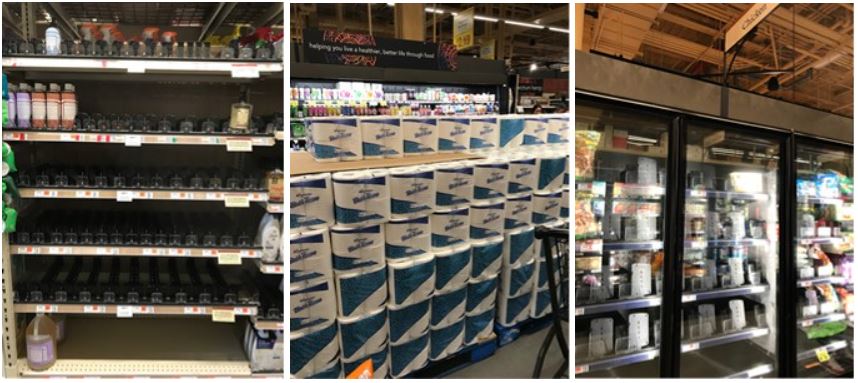
Sunday, 3/15/20
Greensboro, VT
Drove to VT yesterday, bringing two friends, sticking to our original plans. Hard to deny that it feels safer up here. Far fewer surfaces to touch that have been touched by unknown numbers of other people. On the drive up, at the Guilford rest stop just over the Vermont border, there were signs taped to the door: “Coronavirus/COVID-19 Self-Screening Test,” with questions to ask yourself before entering the building. Have you felt like you have a fever or signs of respiratory illness in the last week? Are you in the population most prone to contracting coronavirus? Have you recently been exposed to someone who has tested positive for COVID-19? Are you traveling from a coronavirus-affected region (see vermont.gov/covid-19 for a list of affected regions)?
We didn’t look to see if NYC has made the list yet. We went inside anyway. Jose said everyone in the men’s room washed their hands, which is, apparently, unusual.
We stopped for groceries. No flour (at least no big bags or the popular, Vermont-based King Arthur brand), and we got two of the last three cans of black beans. No dried beans available.
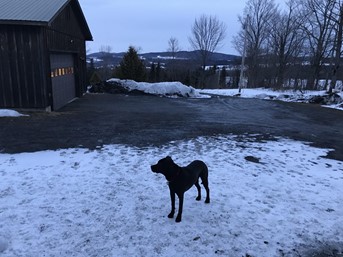
It’s maple syrup season in Vermont. My partner, Josh, and I have a small cooperative syrup production setup: 100 taps in sugar maples along the treeline on the property we rent, and an arch (a wood-fired contraption with two metal pans in which to boil off water and distill maple sap into syrup). Four other couples are in on the cooperative. Today Josh and I collected sap, 125 gallons. Best day of the year so far. Everything felt normal, tromping around in snowshoes, avoiding the melted-out rocks and sticks, falling through the crust where the snow’s been warmed by almost-spring sun. Topper, our dog, bounding along.
Monday, 3/16/20
Greensboro, VT
Isabel, Jose and I went to the self-serve Museum of Everyday Life and admired all the quotidian objects: toothbrushes, mirrors, matchboxes, dust, and the special exhibit on scissors, all housed in an old barn. We cut paper snowflakes to tape on a black wall. Isabel cut a lock of Jose’s hair at the haircutting station, part of the scissors display.
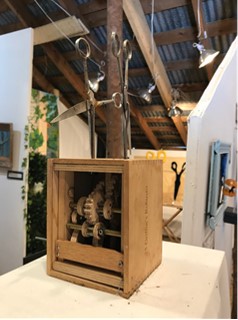
People came over to boil sap. A gathering of more than 10 (the state-ordered maximum), I admit, all people who are part of the syrup-making cooperative. We grilled burgers and hot dogs, drank Coronas with lime (“it’s good to support them, they’re losing business”). Isabel and Jose talked about finding a place to live in the mountains in Colombia, a place like here.
The rest of the crowd was being foolish, loud, as usual. Poking fun at each other, talking about Vermont life, how prepared we are, how easy we have it, the social distancing. I felt weird: guilty about putting Isabel and Jose on a train to NYC tomorrow. They’ll be fine, of course. But still. Colombia closed its borders today. All of our classes will be online until the end of the semester.
Wednesday, 3/18/20
Greensboro, VT
This, too, shall pass. Being here, I sometimes have to remind myself what’s happening in the wider world. Being in NYC, I couldn’t forget. I don’t know which I prefer.
Solidarity is being offered. Google Docs with lists of mutual aid networks, GoFundMe pages, PayPal donation opportunities, resources for those in need or able to offer assistance, grocers, deliveries, housing, shelter, cleaning supplies. Slack channels for organizers and advocates.
But also: urgency right now means staying home. This is only the beginning.
Jose and Isabel got on a train yesterday. We hugged goodbye in the tiny Montpelier Junction station. It was snowing. “I hear New York is a ghost town,” said the Amtrak employee from inside her trinket-filled office. The platform was empty except for one other stony-faced traveler, and a little boy who had come to see the “choo-choo” with his grandparents. Isabel and Jose were rushed onto the train, waving over their shoulders, and calling last words, in a scene reminiscent of the movies: an unexpectedly hurried goodbye, rimmed with grief, danger, and the uncertainty that the parting characters would ever see each other again.
According to Netflix, people have been watching old films like “Contagion” at a record rate. Is it helpful to compare this reality to movies? Maybe fiction is the only place we can look for comparisons.
Josh and I stopped at two grocery stores to stock up on food. The federal government has now recommended that everyone stay home, except for essential activities, as much as possible, and limit gatherings to less than 10 people nationwide, no discretionary travel, and, of course, wash your hands, cover your mouth when you cough or sneeze, don’t go anywhere if you feel sick.
My mom (librarian and town welfare director in central New Hampshire) is on the town ICG (Incident Command Group). She seems pleased. My dad continues to work alone in his office. Small, local libraries are offering home deliveries and curbside pickups. Josh’s dad goes to and from home and his office/wood shop, alone. Josh’s mom is finally, we hope, moving all her therapy appointments online. We worry about her bringing COVID-19 home to his dad, who is in the at-risk category. My mom recently, morbidly, on the phone: “at least most of the family we had who are especially at risk have died in the last year.” We count the still-living. Every tally feels like a death sentence.
Saturday, 3/21/20
Greensboro, VT
The news unfolds quickly. NY, NJ, CA, CT, IL all have stay at home orders. Last night, my roommate, Jeff, had a virtual game night with some friends. Everyone is figuring out how to stay inside, how to pass the time, alone but social.
My niece, Emma (6), has been writing and illustrating a book about the Color Majudul. Her sister, Fanny (4), has had a lot of solo playtime (which she loves). They go on car trips to the beach or the Medford Fells to get outside, away from people (at least 6 feet). Emma and their mom, Lisa, a doctor in Cambridge, MA, both have coughs and other vague COVID symptoms. Lisa got tested at a drive-thru site in Somerville on Wednesday (or was it Tuesday?). She can’t work until they know the results. And if she tests positive, she can still work as long as she’s asymptomatic for 72 hours. The same is true of healthcare workers all over. She’s been told she’s not allowed to leave the state.
Josh’s grandmother went into the hospital on Thursday night, and tested positive for COVID yesterday. She was put in isolation, and was disoriented enough not to know what to do with a phone when Josh’s mom tried to call. This morning, she’s doing a bit better, on less oxygen. I watched the idea of his grandma dying alone, no family beside her, dawn on Josh. An effect he hadn’t yet considered.
Also yesterday, his cousin called from NYC to ask about our closest hospital. His wife is due to have their second baby on April 11th, and they’ve been told that there might not be bed space for them, or medical supplies in NYC by then. So they’re looking for somewhere else to have the baby, maybe to induce early delivery in order to time the birth around the peak of the pandemic in the Northeast US, which is predicted, currently, for mid-April.
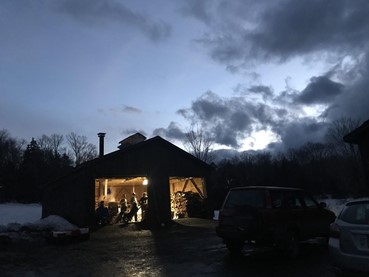
Meanwhile in Vermont, it’s that riotous season between winter and spring. Two days ago, Josh and I put skins on our skis to climb up a nearby closed ski area, and skied down. Topper came too. There were about 20 cars in the lot, all folks doing the same thing. But we had the windy, cloud-socked summit to ourselves. When we got down, a classic apres-ski parking lot party was in session. Bags of chips being passed, beers in hand, people perching on tailgates. Not everyone is being serious about this yet.
Yesterday, work in the morning, boiling sap in the afternoon and evening. We made 6.25 gallons of syrup. It was warm, around 60 ˚˚F, gusty, rain showers, then the clouds broke around sunset. It was the dramatic kind of weather-changing-evening that I couldn’t stop watching.
I couldn’t help but think: nature tried to get us with the big – the hurricanes, earthquakes, tornadoes, fires – but now she’ll get us with the small.
Tuesday, 3/24/20
Greensboro, VT
Last night, we had a Zoom hangout with friends from when we lived in Ohio, four years ago. Lynn said that yesterday, when she was out running in Wake Forest, NC, an older gentleman neighbor stopped her to say hi. He informed her that Christians couldn’t get coronavirus. Lynn didn’t know how to respond, but she filed the story away to tell everyone (she said). It was good to catch up with them all, to get a virtual tour of someone’s new house, to weigh in on what color Lynn should paint her kitchen cabinets, to see each other’s dogs. They all look older, grayer. Mostly the dogs, but the people too. Someone will have a baby in the fall; someone else will get married; Lynn’s kid will start kindergarten. Normal life continues, at least in the future. One friend said that every time his mom calls, she’s in tears. But he’s not sure what exactly she’s scared about. Lynn’s mom, in Utah, is more worried about the earthquake that recently struck. She’s staying home from work not because of COVID but because of the aftershocks. These are the kinds of details we collect, stack up.
Josh and I met some of our neighbors for the first time on the last sunny day (Sunday?). Two different couples walked by, one through the corn field, one on the road, and stopped to say hi and introduce themselves. They commented on social distancing, being outside, asked about our syruping operation. We kept our distance, calling across the stone wall, apologizing for our barking dog, for not having met in the almost three years we’ve been here. “Maybe when this all clears up, we can get together, have a sauna,” suggested one neighbor. The hope, always timid and tenuous, that we occasionally allow ourselves.
Josh’s grandmother is doing better, though still incoherent. She’s been off her dementia medication since being admitted to the hospital, part of the problem, plus being away from a familiar place. The nurse asked Josh’s mom if his grandma speaks a different language – that’s how difficult it is to understand her (she doesn’t). No one can visit her, though some of her family lives nearby. Michigan’s orthopedic rehab facilities are being converted into COVID care centers for less severe patients who need isolation. They’re trying to find a bed for her in one of those places.
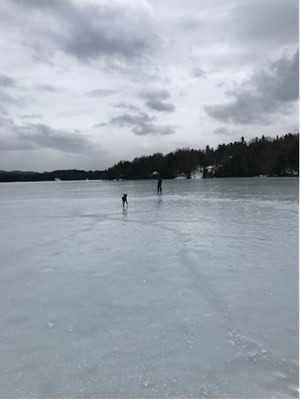
We went ice skating. It wasn’t great, too bumpy. We flew a kite one day, under a bright blue sky, and saw a few other skaters. Yesterday, we beat the snow but not the wind, fumbling/fighting our way to the end of Little Hosmer Pond and back with our friend Cory and his dog. Cory said two of his college friends are finishing residencies in NYC hospitals right now. One has been on the easiest schedule ever, since all elective procedures have been cancelled, and they’re still preparing for the onslaught of COVID patients. The calm before the storm. The other friend is studying psychiatry, working on an oncology floor. All week, she’s been telling patients’ families (in more sensitive language than this) that it might be best to think about pulling the plug sooner rather than later, given the public health crisis and need for hospital beds.
Every town in Vermont has a message board called Front Porch Forum. There, a weekly community supper requests empty yogurt containers and lids to distribute free food to those who show up or ask for a delivery. In their curbside pickups and home deliveries, the Craftsbury librarian has noticed two trends in requested materials: immersion or escapism.
Wednesday, 3/25/20
Greensboro, VT
My aunt sent me a voice message via Facebook. Recommendations for preventing COVID-19. It cited Chinese knowledge in the wake of their coronavirus peak, and prescribed drinking lots of hot liquids to help relax throat muscles and clear airways. It also recommended taking a sip of water at least every 20 minutes to wash any stray coronavirus that might be in your mouth into your stomach, where digestive juices will take care of it.
I never know what to do with this kind of advice. It’s hard to argue with drinking more fluids in general, especially water, warm or cold.
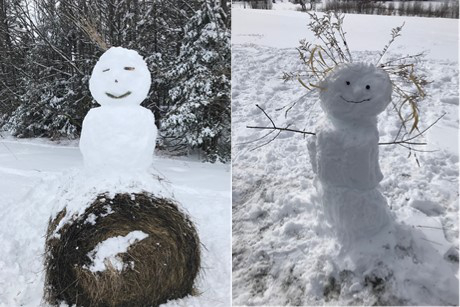
I read an article about different blood types and their susceptibility to COVID-19, also out of China. I thought of blood quantum and indigenous identity, colonial law, violent documentation, rights granted, land seized – all based on blood. Now, genetics, DNA testing, the subcellular level on which human identity, diagnostics, genomic design, familial ties, are being developed and confirmed. I have a card that says my blood type, for when I donate blood. Could that become as important as my driver’s license or Social Security card?
Today, after going for a run and job hunting, we built more snowmen. The first, from yesterday, made use of an old round hay bale that was left in the field last summer. He still stands, though precariously. We built four more at the bottom of the driveway, hoping to provide some entertainment for our neighbors, whose houses are spread apart, out of sight, but many of whom seem to walk by daily. I was in charge of decorations foraged from shrubs: arms, hair, noses, eyes, mouths. Within a few hours, the snowmen had succumbed to the warm sun and thawing ground. “In this brief life that only lasts an hour, how much, how little is within our power?”
Thursday, 3/26/20
Greensboro, VT
I’ve been connecting more with old friends than new, these last couple weeks. My first inclinations to reach out just to check in were to friends from childhood.
Last night, we had the first virtual Wednesday night anthropology department workshop. Good attendance on Zoom, including a few faculty, for part of it. Nice to see so many familiar faces, to listen to familiar voices, and feel the same pangs of affection and annoyance, even virtually. My internet proved difficult, and I had to ask Josh, who was streaming something downstairs, to switch to a lower definition option to free up bandwidth. Rural life.
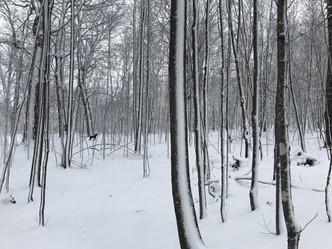
Tuesday afternoon, Josh and I played in the snow. Eight fresh inches fell the night before. We snowshoed around the woods, Topper busily chasing animal trails and scents, pungent in the warmer air, tracks obvious in the new snow. It’s spring, and everything is waking up. There’s a fox who makes rounds through our woods and fields. We saw it twice in one day out the window, morning and evening. I’ve been trying to follow its lead: get outside in the morning, and again later in the day, even if just to check the sap buckets.
We also saw a woodchuck, oddly chubby and sleek considering the time of year, in the front yard a few days ago. Josh chased it away, thinking of our summer garden, which we might depend on more this year than normal. (As will other people, I expect. Our friend who works for a local seed company, High Mowing, said they’ve had record sales this month.)
I like to think wild animals are taking advantage of decreased human activity, like the dolphins swimming Venice’s newly-quiet canals.
Friday, 3/27/20
Greensboro, VT
My second round of bread baking was more successful. My roommate in NYC, Jeff, noted that he couldn’t find yeast in any stores. I had a hard time finding flour. I like to imagine people all over, quarantining, trying to bake bread for the first time: the failed proofs, the soggy bottoms, the ecstatic, glutenous successes.
So far, Josh and I have been good at finding ways to occupy our time. He’s turning wood in the garage today on his lathe. I finished a book, pruned an apple tree, wrote some emails. I’ll finish some other projects later, I hope: a baby hat for Josh’s infant niece, a wooden menorah made of scraps.
Josh’s brother called while out walking his dog in Cambridge. He talked to Josh for a while about us being his daughter’’s godparents. They’re redoing their wills, and trying to decide between us and her mother’s brother. Josh assured him that, if the situation arose, we would raise the baby to their wishes, but said we wouldn’t be offended if they chose the other uncle. Life often has to undergo rearrangements: if we ended up taking care of a kid, we would rearrange our lives for her as needed. (This, too, is a time that requires rearrangement.) I wonder how many similar conversations are happening around the world, about the type of future that once felt unthinkable but now feels possible.
Saturday, 3/28/20
Greensboro, VT
I went to Willey’s General Store yesterday for the first time since our initial stock-up day over a week ago. Their motto: “If we don’t have it, you don’t need it.” I found it closed, with signs asking customers to call in orders ahead of time, and pick up through the window by the gas pump. I drove to where I knew I could get cell service, and called in an order. I spoke with the guy who runs the hardware department, Earl. I know Earl a bit, since I used to work for a friend of his. I could imagine his cheerful, round face concentrating as he wrote down my order, fresh produce and dairy products.
When I went back to pick it up, I stood near two guys, also waiting on orders. A woman who works at Willey’s leaned out the window to display a three-pack of yeast, saying to the older guy, “He says it’s yours for $10 if you want it. His wife called to say she doesn’t want to make bread tonight.” Chuckling, with a rural New England drawl, “Alright then, add it to my order.”
The two guys didn’t seem to know what to make of me. We smiled, and they went on yakking. They likely thought I was an out-of-towner, as did the other older guy who showed up as I was waiting by the front door to collect my box of groceries (as instructed). He eyed me, unsmiling, and said, “the window’s over here.” I explained that I was waiting for them to bring out my order. I think my reputation was somewhat rescued when the Willey’s employee chatted like she recognized me, which I think she did (she has before). I often struggle with this: asserting my status as a local, when I currently spend most of my time in New York. How are they supposed to know that I was born and raised in a town so like this one, with all the roughness and small talk through car windows in the middle of Main Street, all the dirt-bike-fixing projects (one guy was waiting on a length of chain to be cut to fix his bike), the need to get home to put the chickens in, the contradictory neighborly-ness and stay-off-my-property signs.
Coronavirus has sent people from the cities to second homes in small towns, vacation towns, like this one. Those towns’ permanent residents are fighting back in news and social media outlets, asking city folk not to infect the rural population, to potentially burden their smaller hospitals. I’ve hoped not to be the person from NYC infecting the Northeast Kingdom of Vermont, but we’ll see. I’ve been coughing a bit recently, and feeling fatigued. But it may be a lack of the social time extroverts like me need to recharge.
Luckily, yesterday was full of virtual social time. First, a meeting with fellow anthropology students; then a class; then a Zoom call with college friends; then another Zoom call with friends from Ohio. (Zoom stock must be doing well right now.) The virtual happy hour with college friends was the most relaxed – everyone was so themselves. Erin, who’s a midwife and on the front lines at a hospital every day, bemoaned being single in the time of COVID, and not being able to have sex for, potentially, months. Jokingly, we all asked Vinny, a computational biologist at a pathology lab in Berlin, if he’d made a vaccine yet. Gwen gave her husband a hard time when he left the toilet seat up in the bathroom, visible on all our screens down the hallway behind her. At one point, Gwen’s chair completely broke under her. We couldn’t stop laughing.
On the later Zoom call, our friend in Montana told us he and his girlfriend just broke up. He’s dreading being single right now. I offered to try to set him up with Erin. We talked about how online and phone sex are having cultural moments.
He read us Montana’s governor’s version of a stay-at-home order, which mentions that outdoor recreating is an allowable reason to leave your house, but that you should recreate safely, including backcountry skiing only if practicing proper avalanche safety. Outdoor spokespeople, organizations and leaders have been warning people to be conservative in their outdoor decision-making, to manage risk carefully, so as not to overwhelm emergency services and hospitals. Parts of the Appalachian Trail have been shut down.
The Craftsbury General Store, nearby, is letting customers order bulk wholesale items at cost, to be delivered on their weekly truck. Our friend Nina got 50# of flour, 20# each of rice and black beans for her family. Nina came to collect sap with me on Thursday. She’s been riding around Craftsbury in the school bus delivering meals to kids this week. Now that I’ve been mostly isolated for 14 days, I’m eager to start helping. Lots of people around here are also eager to help. It’s that kind of community (at least parts of it). Sewing face masks is a popular pastime.
My dad told me about his friend in NYC whose girlfriend is staying with him. She’s from Korea, and was unable to fly back when she was supposed to. She’s teaching all her university classes online, in the middle of the night.
Monday, 3/30/20
Greensboro, VT
We boiled sap for 11 hours on Saturday. 10 gallons of syrup. Friends came over, all the same people who we decided, weeks ago now, to isolate with, as a closed group. Some neighbors stopped by to say hi. It was sunny, nearly 60 ˚F. We made waffles and poured on syrup straight from the evaporation pan. Bloody Marys and Coronas turned into Micheladas. It felt like any other spring day in Vermont. Except for the conversation, the hopelessness.
A Zoom call that night with some friends. They all seem to be coping by drinking a lot. One said that she feels like everyone who’s leaving NYC is a “pussy,” that she couldn’t imagine being anywhere else right now. Another friend was obviously taking the whole thing hard, but joking it off, as she always does. Another talked about the benefits of exercise, and having a dog.
I’ve also felt the benefits of having a dog. Someone whose behavior seems unaffected by the state of the wider world. Though he is very much affected by the fact that Josh and I are both at home all the time, and he doesn’t get as much alone time as he’d like. Lots of sulking and wandering the house whining.
There are two foxes in the woods and field behind our house, not just the one we’ve been seeing. Two mornings in a row we watched them running and playing in the field. They’ll be harder to see once the snow melts out.
Yesterday was the first day I didn’t leave the house. Not even to go outside. I made crackers and talked on the phone. Tried to work on some projects. FaceTime with my brother and his two daughters, Fanny and Emma. They were writing birthday cards to my dad (it’s his birthday in a couple days). They were goofy, and my brother was patient with them in a way I’ve always admired. He’s been working from home, editing documentary footage for a project for the Basketball Hall of Fame. He went on a long run this weekend, in preparation for an upcoming marathon. It’s now become a “virtual marathon,” so everyone is supposed to run on their own, and they’ll get their swag in the mail. I told him about the article I saw, featuring a man in France who ran a marathon inside his apartment (no treadmill involved).
Today, Josh and I ventured out to get rid of some trash and recycling, and mail packages to our siblings and nieces. The post office, which shares a building with the Craftsbury General Store, had a sign asking customers to stay outside until the tiny room was clear. The Genny has a huge, hand-painted sign advertising their curbside and delivery options, asking people to call ahead, or order on the porch (which I did). A favorite recent Instagram post: “Remember when going to the grocery store was something we did on the way home from doing other things?”
Tuesday, 3/31/20
Greensboro, VT
I heard a small plane fly over, low, and realized how absent that sound has been from my days. Normally, commercial planes pass overhead here a few times a day. Recently, more silence.
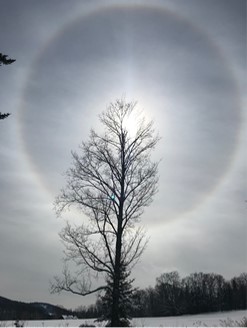
I don’t know that I’m spending more time in front of a screen than I usually do, but it feels that way. I now rely on screens for more than just work, school, and entertainment. I’m not sure my laptop was designed to withstand the ravenous hunger for emotional connection it’s now faced with every day.
We awoke to a dusting of snow and a bright sky. The push-pull of seasons adds to the interminable wait for the virus to take its toll. My mom on the phone today said that New Hampshire has begun listing the number of coronavirus cases per town in the state. As of today’s announcements, there were no cases in her town (my hometown). She felt like people around her were actually disappointed. Like they’re all waiting for things to get bad so that things can get better again.
Wednesday 4/1/20
Greensboro, VT
Another Zoom call with a group of college friends, folks I used to spend weekends in the woods with, climbing mountains and sharing bottles of whiskey around campfires. Now, they’re all in little boxes on my computer screen, physically scattered around the country.
One guy is still in New York City. He had been planning to return home to Tennessee, but his job was deemed essential, so he stayed. He works at the Museum of Natural History, which is, of course, closed. But because he’s the youngest in his department, and lives within walking distance of the museum, he was chosen to keep all the experiments going in the geology and astrophysics lab. He said that yesterday there was a shooting outside his apartment, and it took the police over an hour to show up. They’re stretched thin, because so many have COVID-19. He said he expects the National Guard will arrive soon, to provide backup in the midst of a likely crime surge.
Someone else told a story of an island in Maine, where a seasonal resident with New Jersey plates sought refuge but then refused to quarantine. His neighbors felled a giant tree across his driveway so he couldn’t leave his house.
Parts of the White Mountain National Forest closed today, a haven for outdoors enthusiasts in the northeast. The only other time I recall it closing was during Hurricane Irene, in 2011. Then, roads and trails were flooded, trees falling in high winds and torrential rain. At the beginning of this crisis, I kept thinking it would be like others I’ve known, when the requirement to stay home and slow down had to do with bad weather and power outages. I imagined reading by the light of a candle.
Thursday, 4/2/20
Greensboro, VT
Grocery day. Josh and I opted not to bring our own bags, as we normally do. Some places have banned reusable bags altogether, an understandable but depressing turn of events after plastic bag bans have swept this part of the country in recent years. A microcosm of all the regulations the Trump administration is discretely removing in the name of coronavirus management.
We bagged our own groceries, trying to be friendly to the young woman (young enough that she had to call a manager to check my ID for purchasing a bottle of wine), behind the newly-installed plexiglass. People moving about the aisles (and there were surprisingly many) either smiled sympathetically at each other, or fiercely went about their own business. Still no all-purpose flour to be found.
Josh had seen a YouTube video on how to sanitize your groceries before bringing them into your house. Wipe down all plastic and metal containers. Using clean hands, remove the inner bag of cereal and discard the outer box. I scrubbed a colander of citrus with soap and water, thinking about a chef I once worked for. He instructed me to wash the rind of a melon before cutting into it. “But I’m going to cut off the rind anyway,” I said. “But your knife will push all the dirt on the outside to the inside. And where do you think melon farmers pee when they’re working in the fields?” Between food safety and hypochondria, he saw the possibility for contagion everywhere. So, now, do I.
Sunday, 4/5/20
Greensboro, VT
This morning, on a three-way video call, a friend who’s a social worker finally explained to me the toilet paper demand and resulting empty shelves: it’s a classic reaction to trauma. Faced with uncertainty and lack of control, our first impulse is to meet the most basic of our needs: “It’s like, more than anything,” she said, “we have to be able to wipe our bums.”
She said it with a laugh, characteristic of a seemingly-endless well of empathy that mingles with a stark realism and threatens to topple over the edge into depression. A laugh more worthy of my admiration than I knew how to voice.
This same friend has finally found a place to stay as she tried to keep her family safe, herself sane, and support her clients from a distance. She still blushes when talking about a new boyfriend. Now they’re navigating dating in a pandemic. The three of us on the video call discuss the romantic comedy potential of this situation, and the other friend suggests sending her story to the Modern Love podcast, which has shifted from its usual programming to collect and share stories of love in the time of COVID-19.
Monday, 4/6/20
Greensboro, VT
My first trip out of the house wearing a face mask, per the CDC’s guidance. I drove a delivery route for Meals on Wheels, which provides a daily meal for low-income seniors. It was my first time volunteering for MOW. I got an orientation, and was accompanied by one of the organizers on the route (in seperate cars). She made sure I followed protocols and introduced me to the people we delivered to. Because of coronavirus, there are extra protocols for not contaminating the food being delivered, and we’re delivering a week’s worth of food at a time. The contamination protocols came easily for me. So did the friendly-yet-detached task of arriving on strangers’ diverse doorsteps. For one woman, we were the only people she’d seen in a week. Her hunger for conversation was palpable, as she wrapped a wool scarf around her face as a mask, and talked to us through the screen door. She kept pushing the door open, wanting to get closer, then stopping herself. Six feet.
A few hours with a bandana poorly positioned and loosely tied around my face convinced me to try to sew a better mask. Online, the pattern possibilities are endless – many hospitals have been sharing patterns or publishing their own. Different possible features: pleats, a curved front, pocket for a filter (e.g. cut-up vacuum bag), wire sewn in to go over your nose (best for people with glasses, to keep them from fogging up), elastic, cotton ties, shoelaces, or T-shirt material for straps. Some of them are quite complicated. Others are rudimentary. The CDC suggests just folding a piece of fabric in a certain way and using two rubber bands or hair elastics to hold it over your ears. Cotton is always the recommended material, the tighter the weave, the better. Not recommended: wearing medical grade masks or N95’s – reserve those for healthcare workers only and avoid public shaming.
I’m grateful to be able to help, especially since it gets me out of the house.
Tuesday, 4/7/20
Greensboro, VT
The camp I was supposed to run this summer in Washington has been cancelled. The committee voted on it last weekend, in a video meeting. I was present virtually. We discussed the challenges of holding a camp in a rustic setting (everyone lives in canvas tents), with an outdoor kitchen, no running water or electricity, rented portable toilets, all facilities shared among 70 people, while serving a demographic that’s largely in the riskiest age range (60+). Not to mention the fact that almost everyone arrives by airplane, and flights are few and far between these days. One committee member described his recent work travel: what should have been a total of 4 flights through 3 cities became 16 flights through 8 cities. Oh the chances for contamination! We talked about the 2021 season, too, and agreed we can’t guarantee that camp will run then, either. So many things might have changed in a year: the price of food, the price of services, flight availability, and the medical screening we’ll need campers to complete before we can allow them to attend camp. COVID-19 can decrease your lung functionality, someone said (a retired nurse). For a hiking camp that brings people to high elevations, that’s a potential hazard. And we might need them to be screened for COVID antibodies.
Maybe, a professor suggested in class this afternoon, we’ll all carry “immunity passports” in the future.
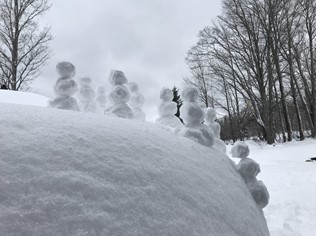
I heard a news story about overfilled morgues. States are renting refrigerator trucks for extra storage space. That night, I had a dream that the cold trailer I’d reserved to store the camp’s food was cancelled. The city of Seattle needed all refrigerator trucks registered in a 50-mile radius to hold dead bodies.
As the camp’s manager, I now have to notify all the staff that they no longer have summer jobs. The organization that owns the camp might be able to place them elsewhere, but those jobs are not secure either. I feel horrible about the news I have to break, and sobered by the knowledge that it won’t come as a surprise to anyone. Increasingly, summer plans are being cancelled. It feels irresponsible to make any guarantees. Contracts are being written with new COVID clauses. We’ll all get more used to breaking promises.
Anxiety about the future starts to settle in. Impending financial instability. Gratitude that my partner has a salaried job, that the state of Vermont has already promised to bail out his employer.
Wednesday, 4/8/20
Greensboro, VT
I’m surrounded by corpses.
It’s the start of fly season. The first warm sunny days bring them out: they coat the east-facing side of the garage and house, buzz furiously in the windows. I don’t know where they come from, but the possibilities for fly-sized crawl spaces in the walls of a log cabin are infinite. They effortlessly move from the outside to the inside of window panes, or settle between the screen and the glass. Buzzing. Always buzzing. Something sets one off and it goes careening, insanely, in circles around the room. Hits my eye. Scuttles across my keyboard. They’re getting bigger. That one has extra legs.
I finally lost it. Got the fly swatter. Now, corpses. I add a few every hour. Not without acknowledging that this is life I’m squashing. Sometimes it takes a few smacks to stop their wriggling. I try to make it quick, but the fly swatter is not advanced technology. Some bodies stick to the window panes, and I pray others will heed the warning.
Josh asked if I’d like him to bring up the vacuum. Maybe later. And get the stairs on your way up, please.
In other animal news: we saw a bear at the bottom of the neighbor’s field. A big one, who turned a calm face toward us, then ran for the woods when she saw Topper. This morning, I heard a great horned owl, with its hoo hoo hoo-hoooo, hoo hoo hoo-hoooo. The deer came back, to forage in the grass and willows beneath the apple trees.
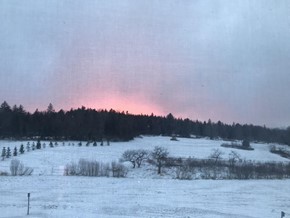
Everyone has been watching “Tiger King” on Netflix, a docuseries about big cats in captivity in the US. The other day, I saw a news story that a tiger in the Bronx zoo was diagnosed with COVID-19, and has spread it to other big cats in the zoo. Though the virus originally came from animals, I can only assume humans are responsible for infecting that tiger. The havoc we wreak extends far beyond ourselves. I don’t know what to do with the shame of it.
Thursday, 4/9/20
Greensboro, VT
I finally ordered seeds today. There’s been a run on all things agricultural – seeds, plants, baby chicks – so it was hard to find what I wanted. Johnny’s Seeds, Fedco, Seed Savers Exchange’s commercial farm, and Hudson Valley Seed Co. are all not accepting new orders until they catch up with the ones they have. I found some seeds at High Mowing, though they were sold out of many varieties. I found more at Solstice Seeds, a small seed company in central Vermont. Then I went to the Seed Savers Exchange site, and requested some seeds from gardeners across the country who save seeds each year and make them available to other gardeners, for trade or shipping fees ($3 on average). Last fall, most of my course projects centered around seed saving on different scales and for different imagined futures: next year’s garden, increased agricultural diversity, a global catastrophic event. Now, it seems, we’re living through the type of historical moment many seed savers I interviewed talked about, when the agricultural supply chain is experiencing tumultuous change, and the future of food, as with many other things, is uncertain.
This could be a chance to reimagine supply chains and food systems. As families, communities, and individuals take matters into their own hands by planting gardens in yards and containers, perhaps the local food movement will take hold with new gusto, less out of interest than need. Talking to a usually-dour Marxist anthropologist friend who studies corn, just the prospect of remaking our food system makes his eyes shine. This is a chance for a research project. But how to generate the will, the enthusiasm. Practical tasks drain my energy.
Saturday, 4/11/20
This has been a tough week. I feel exhausted. And it’s been snowing since Thursday. “April is the cruelest month, breeding / lilacs out of the dead land, mixing / memory and desire…”
I’ve been trying not to give in to the drag of memory, the hopelessness of planning for the future. Yesterday I had to call all my would-be employees and tell them that their summer job has been cancelled. And I had to face the fact that that same job, which would have bought me some time before trying to enter the job market post-graduation, is no longer a safety net for me either. It’s getting harder to ignore the future, and harder to use the pandemic as an excuse to not make plans. I keep being reminded: you have to make plans in order to change them.
My laptop, which has felt like a much-needed source of connection, is now a source of anxiety. Sitting down in front of the screen each morning, trying to read, write, answer emails, join a Zoom meeting, plan for final papers or job searches…And it doesn’t help that my “office chair” is straight-backed and wooden. Never have I longed for a cushy, swiveling, seat like I do now.
At least the snow allowed for another snowman to be built. This one perches on the back deck, peering in the window, standing in for a friend spontaneously visiting, or the Jehovah’s Witnesses who once arrived on that same deck on a sub-zero January day. I was amazed their little car made it up the driveway. This snowman is curious, and looks both puzzled and slightly perturbed. Topper hated him at first. Wouldn’t come into the living room because of the imposing figure outside. Now they seem to have made their peace.
I’ve made more snowmen this year than in recent memory. In a class yesterday, someone paraphrased the book we’d read, Tristes Tropiques: anthropologists try to stay children for as long as they can.
Last night, on a video chat with old friends, we discussed the idea that what matters is not that one is good, but that one keeps trying to be better. Two math-minded friends, an electrical engineer and a computational biologist, Vinny, wanted to come up with a word for the rate of change, the movement over time of an individual toward good. (Putting aside, for the moment, the definition of good.) I watched deer foraging for old corn cobs in the dusk outside my window. Vinny drew three graphs with the y axis labeled “good,” the x axis labeled “time”: a line sloping up, a line sloping down, and a flat line. Maybe each trend needs its own name? Or can all three be encompassed in one name?
“Faith?” the biologist suggested.
Sunday, 4/12/20
Greensboro, VT
Josh, Topper, and I had a clandestine meet-up with my parents, who live in New Hampshire. We met them in the middle, just across the border, about an hour away. We parked at an empty high school, and walked around the ball fields. Topper found some old fly balls in the woods to chew on, but preferred a stiff, fluffy squirrel’s tail, the body to which it belonged having met some other fate.
The primary purpose of the rendezvous was for my parents to give us gardening supplies. Essential agricultural business, we planned to tell the cops, should we get pulled over. The roads were not as empty as I expected. At the border going back into Vermont a large construction sign warned visitors from other states that they were expected to enter quarantine for 14 days upon arrival.
It felt like a treat to be driving on the interstate, after barely leaving the house for weeks. Just the day before, a new record was set for the “Cannonball Run,” the drive from New York City to Los Angeles. 27 hours. That will be hard to beat, since the highways now are emptier than they’ve ever been. I remember the feeling of driving fast across open plains, the freedom that a car brings. Now that public transportation is so restricted, having a car provides a sense of security – not that there’s anywhere to go. At the same time, I hate the rural reliance on cars. Last week, the price of gas at a nearby station was $1.50. Now that Trump and OPEC have arranged for a decrease in oil production, it will likely climb back up.
We talked with my parents about the virus, and how my dad’s life hasn’t really changed that much. He works by himself in an office, bikes from and to home. He works in environmental waste management, consulting on policies and procedures for treating, composting, and otherwise disposing of solid waste from municipalities. Normally, “sludge” from wastewater treatment plants that isn’t composted and used as agricultural fertilizer goes into landfills. Those landfills have to maintain a certain balance of dry waste (e.g. municipal and construction) and wet waste (from wastewater treatment). He said that we’re starting to face an unprecedented situation: a decrease in the production of dry waste due to economic shutdowns, which means landfills can’t accept as much wet waste. That waste currently has nowhere else to go, and isn’t part of any state’s emergency plan. This is what my dad has been spending his days thinking about.
My mom gave me a face mask that she made, far better than the one I made myself. She said she chose this one for me because it’s “cheery” and I should wear it when I deliver food in the community. They also sent us home with seedlings, a grow light, and other gardening supplies.
Tuesday, 4/14/20
Topper is bored, and lets us know it. He sits for hours at the back door, body tensed, waiting for a squirrel, wild turkey, or deer to wander by, hoping, when that happens, that we’ll open the door so he can give chase. Other times, he glowers from the couch, or wanders between my improvised upstairs office, and Josh’s kitchen table office, whining. Any time we get a package in the mail, or come home with groceries, he inspects them vigorously, sniffing every inch, returning a few minutes later to see what new scents emerge as others fade.
He misses his dog friends, I think. I miss them too, but mostly the humans that come along with them.
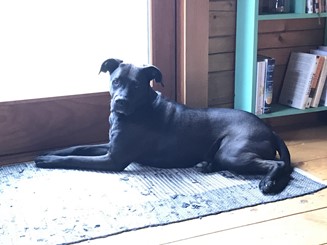
I think of Donna Haraway, and how the social scientists I know are either ardent fans or annoyed by her. I’ve noticed that even those who dislike her work, her literary voice, still can’t avoid referencing her ideas. I’ve resisted becoming a “dog person” in the ways that dog people are sometimes disdained. But I also can’t help, these days, but talk about my dog. What he’s doing. How he needs an attitude adjustment. Entering his world, devoid of the anxieties of a pandemic, is comforting.
Thursday, 4/16/20
It’s been snowing every night, so that the progress spring made the day before seems all but gone the next morning.
Nevertheless, I prepped garden beds today. A neighbor let me get some composted horse manure from her pile, and stood nearby chatting. She’s a high school teacher, a Fulbright recipient whose international fieldwork in Senegal has been cancelled for this year. I guess that she lives alone, and I feel for her the way I feel for anyone weathering quarantine solo.
My friend who’s a social worker recommended a podcast by social worker/professor/researcher Brené Brown about grief and comparative suffering. I listened as I pulled clumps of sod and dandelions from garden beds. One’s own loss is the worst loss. We’re experiencing both individual and collective, anticipatory grief, and we don’t know when it will end. At some point we’ll be able to make meaning out of it. None of this is the kind of thing I usually subscribe to, but I find myself interested on both personal and academic levels.
Saturday, 4/18/20
Besides working in the garden, I’ve been spending less time outside, and less time exercising. I feel it in my body. Today, I’ll spend most of the day outside, moving, not staring at a screen.
I’ve taken part in two rewarding Zoom public events this week, one on the US food system and COVID-19, the other on conducting oral histories of disasters. I appreciated my own anonymity during the 2-hour sessions, the ability to shut off my microphone and camera and watch the conversation unfold, while taking notes or looking up references mentioned by the speakers. I don’t like that I liked that anonymity. But I also felt a sense of community, and was invigorated by the discussions. Talking about the food system, folks were weary of the growing season to come, and the inability of farmers to hire enough workers to plant and harvest, since many of those workers are international migrants, and in precarious positions within the economy and healthcare system. Already, COVID has disrupted food supply chains, not by creating new deficiencies, but by exacerbating pre-existing weaknesses. It’s revealed the food supply chain’s dependency on people. In South Dakota, one meat packing plant is responsible for more than half the state’s cases of COVID, and meat supplies are close to running low. There’s also optimism that this is a chance to rethink the food system, to make it more sustainable, to undo decades of consolidation, and cut out some of the powerful middle men who make it impossible for the milk being dumped in upstate New York to move, instead, to the refrigerators of food banks in city. Maybe people will become more in touch with where their food comes from, and try growing some themselves. But in Detroit, and other places, community gardens have been shuttered, along with parks.
Another online birthday celebration last night, with everyone taking advantage of Zoom virtual backgrounds to poke fun at the birthday boy. Josh’s computer isn’t new enough to work effectively with the virtual background, so we were simultaneously visible and erased into the photo “behind” us. We weren’t the only ones. Digital ghosts.
Sunday, 4/19/20
On a bike ride today, I found myself counting beer cans along the side of the road. There seemed to be more than usual, and I wondered if it was a reflection of the times, or just the build up over winter, only now visible because the snow has melted. One thing people like about living in this area is its “lawlessness.” Craftsbury, the next town over, voted a few years back not to have a town police force, because the only people they’d arrest would be local people, like the people voting on whether to have a police force. And no one wanted that. It’s rare to see cops on the roads around here, but lately they’ve been more present. State police and traffic control. Some people find it reassuring, others hate it. There’s no political divide that I can tell – some of the most progressive people I know here might drink a beer in their truck on the way home. Maybe the difference is that they wouldn’t then toss it out the window. But I’m not sure. Moments like that blur the political divides that sometimes feel so stark in this country. The other day at the general store, the bulky, shaved-head guy in a dirty sweatshirt was wearing a face mask, while the young woman with a kitten on her shoulder, who I know to be the granddaughter of a prominent progressive activist and puppeteer, wasn’t wearing a mask, and got too close to the pickup window. Those liable to shirk the social rules of the day come from all sides. That is, I guess, part of the “lawless” appeal of rural living.
I thought of the protests around the country, headed by white nationalists, 2nd amendment die-hards, and fueled by our commander-in-Tweets. Those people are so familiar to me. Condemnable for their language and behavior (especially the ones who blocked the entrance to a trauma center at a hospital with their trucks), but familiar. We brushed shoulders in the pre-COVID grocery store. I’ve sat around their kitchen tables, laughed about local gossip, argued about climate change. Sometimes, in a small community, differences are put aside.
Monday, 4/20/20
Greensboro, VT
On Friday, the Chancellor of Vermont’s state college system recommended closing two college campuses, consolidating all of the four-year degree programs onto a single campus. The two campuses that would be shuttered (effective at the end of this academic year) are in Johnson and Lyndon, each about 30 minutes from here. These two colleges have struggled with financial support for years, and already combined two years ago into Vermont Northern University. COVID-19’s financial impact has been nearly fatal. Education in Vermont at all levels has gone underfunded for years, amidst an aging population. NVU has been an economic engine in northeast Vermont, and has brought young people into the region (my partner, Josh, is an example). The closing of these two campuses would be an enormous hit to this region, which is already the most economically depressed in the state. Josh and I spent a lot of the weekend discussing potential impacts of the closing, reaching out to various people who would be affected, writing letters to the governor. Next Monday the trustees will vote on whether to follow the chancellor’s recommendation. Just the prospect, which feels probable, has sparked panic across this part of the state. Protestors lined the main street through Johnson, standing 6 feet apart.
I feel like I’m settling into this community more than before I moved to New York. I’m normally so restless, so hesitant to put down roots, to get stuck. It’s like FOMO (fear of missing out) has decreased since everyone’s worlds have shrunk. The stay-at-home order has, in some ways, been good for me, forced me to appreciate this place, this community, despite its many flaws. I miss New York, and still follow the city’s news voraciously, looking for any hints of how my life might be if I were still there. Wondering when and whether I will return.
Wednesday, 4/22/20
Josh’s grandmother and aunt are both out of the hospital. His grandmother hasn’t been able to speak for weeks, though she’s been feeding herself. Hopefully a return to a familiar place will help restore some communication skills. Josh’s mom has been beside herself, trying to coordinate care from afar, with all the empathy of a psychotherapist, and all the struggle of family stress.
Vermont is letting some people go back to work, those who work alone or in pairs, or outside where social distancing is easier.
The flurry of social video chatting has dwindled, and I’m feeling more and more the effects of a prolonged shut-down. On Monday, I was as eager to chat with some of the folks on my food delivery route as they were to chat with me.
Friday, 4/24/20
My temper is nearer the surface than usual. All day I’ve been short with Josh, and I’ve even been resisting Topper’s affection. I don’t know if I need alone time or more diversity in company, but I know that I get frustrated with myself when I’m like this, and that only makes the situation worse. Thank god the snow finally melted today. The last two days were cold, snow/sleet falling and blowing all over.
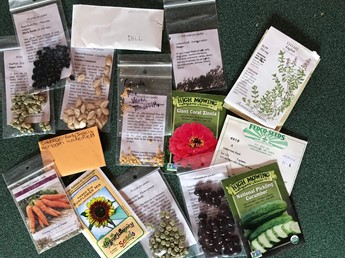
We worked some more in the garden yesterday, despite the patches of snow and frozen ground that persisted well into the afternoon. I planted lettuce seeds in the cold frame. We picked up some newspapers from Nina and Tim. They showed us their newly-built garden beds. Tim, who teaches in the agriculture program at the same college as Josh, said he’s anticipating the collapse of the industrial food system. He’s a somewhat pessimistic Marxist who I suspect is secretly gleeful that a capitalist collapse might finally make more space for a more sustainable, resilient food system.
Maybe we should expand our own garden further, plant more seeds. I daydream about shipping fresh produce to friends in New York and Boston.
The proposition to close the nearby state college campuses has been taken off the table, likely due to the outpouring of dissent from the surrounding communities. Now, a temporary fix. Perhaps, hopefully, something more permanent.
Sunday, 4/26/20
I have to think hard about the date, what day it is. Still the tangible slow down of business on the weekends, mostly evidenced by the lapse in new emails from The New School administration and marketing departments in my inbox. For some, holy days and days of rest mark the passage of weeks and the year: a beautiful photo collection of Ramadan being celebrated around the world at usually-crowded mosques and family tables, now barren.
I’ve been thinking a lot about grief. How we’re all experiencing the loss of…something. “Normal” life, jobs, social gatherings, family, friends, plans and dreams of the future. Listening to stories of virtual mourning rituals, the quiet surprise of Zoom funeral attendees when they realize it wasn’t as bad as they’d expected. Grateful, for that. But please, please, if there’s a COVID cultural shift (and there will be), don’t let us forget that we like being together physically. Now that the conversation is shifting toward “reopening” (“turning on the spigot,” “opening the door,” etc., but decidedly not “flipping the switch”), I’m starting to wonder more not just what like will look like as people emerge from isolation, but what life should look like. We should, I think, be operating more locally. We should be rethinking the systems that provide food, electricity, internet, transportation, education, healthcare. Our “worlds” should, I think, stay small for a while. Personally, whatever collective shift we experience (“we” being anyone who finds themselves making a COVID-catalyzed shift), might make it easier for me to deal with the personal shift from grad school / NYC to whatever comes next.
Monday, 4/27/20
Today is cold, snow and rain. I didn’t wear enough layers when I went to deliver Meals on Wheels. I shivered as I packed bags out of my trunk. Once, I forgot to put on the Latex gloves (new pair for each stop). Mid-way through the route, my first scary experience of someone not coming to the door when I knocked. And usually she’s the chattiest, already at the door as I walk up. I called her name, knocked a bunch, then walked around the house. Finally, her dogs spotted me and started barking, and she turned up at the door. These faces are growing familiar, and I wonder if I remember them better, despite not knowing them well, because I don’t see many others to mix them up with these days. One woman always in a leopard print house dress. Another with purple hair. A guy who always asks if I’ve been fishing (I haven’t) and, today, if I knew where he could get “one of those masks.”
On the radio, as I drove around, the governor was holding a press conference. Masks, he promised, will be with us for a while. Social distancing, too. Masks are emerging as fashion statements. And I’m realizing how much I rely on people being able to see the lower half of my face as I empathize with their stories of chronic fatigue or bones aching in the rain, or smile at their jokes.
Wednesday, 4/29/20
Warm and sunny today. I prepped the rest of the garden beds, adding wood ash and horse manure, planted some oats as a cover crop until the ground is warm enough for vegetables. Meanwhile, seedlings continue to grow inside, on a heating pad beneath a grow light mounted on the underside of the table that’s now my desk. Little green companions, whose seeds arrived from all over the country, from overburdened seed companies and home gardeners, seed sharers.
The nice weather makes it nearly impossible to sit in front of a computer. In California, people streamed to the coast over the weekend. The state that was so exemplary in its early lockdown efforts now threatening to close its iconic beaches. News stories about “quarantine fatigue,” which, combined with some reopenings, could lead to new outbreaks of COVID. On the radio today they talked about vaccine and treatment trials, the sheer number of uncoordinated efforts worldwide to find something that works. A doctor and researcher in Pittsburgh described his team’s trials, which deviate from the normal design of two test groups taking either drugs or placebos. Instead, his team is testing multiple possible drug treatments, and combinations thereof, so that every group in the trial gets something that might work. He calls for scientists, institutions, and governments to put aside their competition and focus on coordinating efforts toward establishing treatments and a vaccine. So much time and resources are being wasted, he noted, because of redundant research.
The college where Josh is on faculty is considering how to teach online in the fall. It’s a progressive school designed around tenants of experiential education – not the type of curricula that translate well to online modalities. He’s supposed to teach two rock climbing classes and a backpacking course in the fall semester. He’s frustrated because the president is completely unwilling to think about different models of how students might be able to return to campus safely. It’s a tiny school – 120 students – that has the ability to rethink its operations in ways large schools do not. But the president is embracing online learning like it’s the only path forward, and planning to do whatever the University of Vermont (with its thousands of students) does for the fall.
Depressing to think that there’s no space for experimentation in the wake of COVID, even in the places one would expect it most.
Friday, 5/1/20
It’s May. Hardly believable.
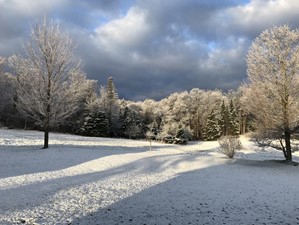
Slowly, plans for the future are forming. Summer stretches ahead as an empty space, fillable, promising to be busy as it always is, but with what? A project with a friend who shares some ethnographic interests; applying to a job or two; tentative plans to visit Josh’s family and to host some friends later in the month. I’ve always liked thinking about logistics, and right now they take on new urgency. If we drive to Massachusetts, can we make it on one tank of gas, and without stopping to pee along the way? Are our current isolating efforts sufficient, or are there additional steps we should take before we go, in approximately two weeks’ time? We talk to Josh’s family about the steps we’ve all been taking, our grocery shopping schedules, my Meals on Wheels protocols. (I realize that the people I’m delivering food to are probably the safest folks for me to interact with – they’re all more confined to their homes than we are.) Travel logistics include not only considering routes and stops, but where the virus might be lingering. We’ll be moving from a less affected area to a more affected area. When we come back to Vermont, we’ll quarantine again. Do we buy groceries for those two weeks before going to Massachusetts, or on our way back? Do we ask a friend to shop for us? (No grocery delivery services in these parts…) Consider: where is the biggest threat? Who do we want to take the chance of seeing? Intimacy has new meaning and scale.
Sunday, 5/3/20
I can tell I’m trying not to think too hard.
My days are developing a rhythm that’s not quite satisfying. I wake up early, either because Josh gets up or the dog comes whining at my bedside. (He’s growing more insistent by the day.) I go downstairs, and let Topper out the back door, where he immediately dashes to the sugar shack (the building in back where we make maple syrup and store wood) to track his new squirrel nemesis, who’s living in a wood pile.
I start making coffee. It’s a process: hand grind the beans, almost-boil the water, French press. I feed Topper when he comes back in. Sometimes he eats, sometimes he’s too busy watching for the squirrel to emerge. I take my coffee upstairs and post up at my computer for as long as I can manage – never long enough to feel productive. Meanwhile, Josh sits at his dining room desk, grading, talking to students, or watching peaceful videos of a guy who’s building a cabin all by himself in the woods somewhere in Northern Europe. Every day, this guy goes out with his golden retriever, a tractor and a chainsaw, and relies on geometry and physics to move giant timbers into the shape of a cabin. Josh is remarkably good at waiting. He’s been increasingly frustrated by his coworkers, who demand to discuss all the possible scenarios for the fall semester. None of them, Josh notes, have any comprehension of decision making models. You make a plan based on the information you have, and then wait for new information that forces you to change your plan. If there’s no new information, any discussion just grows more hypothetical and is a waste of time. Better to practice patience, to sit back and wait, to watch some guy and his dog build a house in the most labor-intensive way possible. No rush.
I’m horrible at waiting.
I break up my computer time with tasks that allow me to move about the house. Check the garden; water the houseplants; worry over the seedlings; mix bread dough; let the dog out because he’s exploding with excitement over a squirrel sighting.
Procrastination is at its height right now because I have finals due in less than two weeks. Usually, I rely on the studiousness and collective anxiety of NSSR to motivate my own writing. I miss the quiet library with its packed tables, the corner rooms off the anthropology department where I usually hole up until the middle of the night. I remember my first semester, finding solace in walks around Union Square with Isabel and Sonia, sad that we couldn’t enjoy the festive holiday spirit like everyone else. I miss the promise of a picnic in the park or drinks on a back patio with my peers after papers are finally done. Will my days look very different once I’ve finished grad school? What will bring me to my desk in the mornings?
Monday, 5/4/20
Yesterday, I video chatted with old friends, the social worker, who finally has more permanent housing, and our friend who’s living in Mexico. She’s still staying with her newish boyfriend and his mother outside of Mexico City. She adopted a street dog as a quarantine companion. Her younger brother got engaged last weekend. She’s evasive with her real feelings about his fiancee, but we all agreed it’s nice to have something to look forward to.
Saturday afternoon we invited a few friends over to sit on our lawn in the sun. Mostly to let the dogs play. We discussed politics at 10-foot distances. Biden is no one’s choice, but voting for him is compulsory. Just think of RBG. She can’t make it another four years. Think of our current president, and his suggestions that we all inject disinfectants to kill the virus. (Brad Pitt as Dr. Fauci on SNL last weekend – thank god for parody in times like these. Satire. Comedy. Sunshine.) The argument from his base has always been that they don’t take him literally. But it’s become apparent that doesn’t matter. Think of the violence he’s fomented. Maybe he hasn’t literally said “Take your guns and go stand outside the state house,” but he might as well have, because the result is the same.
I found out that my favorite bike mechanic in Brooklyn lost his 34-year-old son to COVID. I’ve surprised myself by how sad I am. This is a guy who looks tough – always dressed in black pants, a black button-up shirt, shaved head – and could easily be the kind of jaded, gristly mechanic that gives bike shops bad reputations. But he’s not. He remembered my name from the first time I brought my bike in for service, and he’s always honest about how he’s feeling. He fixes delivery bikes all the time, practically for free, always getting working folks back on the road as fast as possible. Friends of his help out or sit around gossiping and sharing memories of races over the Alps, or last week’s ride out Long Island. We chat on the sidewalk as he opens the shop in the mornings, if I happen to walk by. He was one of the first who made me feel welcome in the neighborhood.
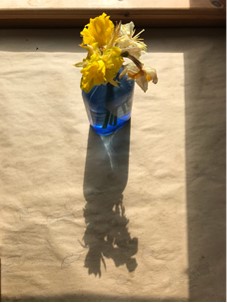
I was reading yesterday about the grief we feel for strangers, how it’s often discounted in stories of loss. Like the only losses that matter are our own. But that’s been disproven time and again by public outpourings of grief in the wake of migrant deaths in the Mediterranean, or school shootings, or police violence, or natural disasters…and now a pandemic. How to live with that grief, how to fold it into our social fabric without discounting it, without trying to leave it behind or inside or below, but let it be a presence in public life, without it being politically instrumentalized – that’s the challenge.
Wednesday, 5/6/20
Some friends from New York want to come visit, but they need to be able to work while they’re staying with us, and that means fast enough internet. Josh and I have figured out it works fine with two people Zooming at the same time, or one person Zooming and one watching Netflix or YouTube. Try to Zoom and watch HBO or Amazon Prime at the same time, though, and the video call gets pause-y (even if you turn off the video part). The friends keep asking how we can make the internet faster. We could purchase a newer, two-in-one modem and router, or get a hot spot that could maybe run off the single bar of cell service we get in the northwest corner of the house. But no, we cannot upgrade our internet service – the infrastructure doesn’t exist yet. Four miles to the southeast or west and we could get fiber. But not on this dirt road.
Of course, this is a problem faced in many rural areas (and low-income urban areas). We’ve been told “they’re working on it.” I recently filled out a survey about cell coverage in this area. Coronavirus is prompting long overdue infrastructure projects, but I’m dubious about follow-through.
Thursday, 5/7/20
Last night I had a dream that we had gone to visit Josh’s parents near Boston. As planned, I drove from there to New York to get some things from my apartment. But I left three days early. After I’d been in New York for most of a day, walking around and grocery shopping with a group of random people (clearly not realizing this might not be the best time to be forging new in-person friendships), I realized what I’d done. My roommate didn’t feel safe with me staying in the apartment for more than the one night (for which he would stay at his girlfriend’s), and I couldn’t go back to Boston to stay with Josh’s family because I was possibly infected now, nor did I feel OK about collecting Josh three days early and returning to Vermont, cutting short his time with his family. I was trapped.
Sunday, 5/10/20
Three inches of snow yesterday morning, and it’s been blizzarding since then. Makes it easier to sit in front of a computer, writing final papers.
Monday, 5/11/20
I listened to most of the Vermont governor’s press conference while driving around today. Every week the same questions: people aren’t wearing masks – why don’t you make it mandatory? Why aren’t you testing everyone in nursing homes and jails all the time just in case? How are you counting the positive tests, by town? County? Zip code? Postal route? Why aren’t you collecting more data? Is Vermont going to get in trouble with the feds for pushing through unemployment claims without resolving all the issues? Why the holdup with payments?
All questions I could answer by now. There must be better questions to be asking. There must be better ways for these journalists and public officials to use their time, rather than struggling with un-mute codes and fuzzy phone lines. I got so frustrated yesterday I started yelling at the radio.
We’re preparing to visit family in Massachusetts starting on Wednesday. We’ll spend a few days there, then I’ll go to New York for a night to collect some things from my apartment, and pick up two friends. On Monday, we’ll drive back to Massachusetts, stopping briefly in Connecticut to say hello and goodbye to Aaron’s parents, who are likely moving across the country before the end of the month. Then we’ll pick up Josh at his parents’ house, waving from across the driveway, definitely not going inside, not even to pee. Then we’ll drive back to Vermont, stopping for two weeks’ supply of groceries, before settling in for quarantine.
Five days of car travel to familiar places and it feels like the biggest trip of our lives. More stress and uncertainty than the month-long mountaineering/climbing adventure in Patagonia. Logistics that have never needed discussing: will we stop to use public restrooms? Should we bring an extra tank of gas? Will we fit in the car with all the groceries, luggage, and two dogs? Are we going to be responsible for spreading COVID to the Northeast Kingdom?
Wednesday, 5/13/20
I-93, NH
This morning I sent in my last paper of grad school, planted some onion starts in the half-frozen-but-quickly-thawing ground, and jumped in the car with Josh and Topper. We drove south on a familiar route, and except for various signs explaining COVID-related protocols (at the state line, “Staying in NH? Quarantine for 14 days upon arrival”), everything seemed eerily normal. Most noticeably, we passed through Franconia State Park, a popular destination within the White Mountain National Forest, where the highway cuts through the mountains, flanked on either side by recreation sites: ski area, bike path, hiking trailheads, waterfalls, a huge cliff face often climbed. All the parking lots were roped off, or blocked by cones. Strange to see wilderness closed.
Friday, 5/15/20
Massachusetts
I graduated today, I think. Last night was the recognition ceremony for NSSR, a livestream event. For the opening, faculty and staff from around the school sent in videos of themselves congratulating graduates. Then the speakers, then, departmental chairs with their own words, before reading out the names of Masters and PhD students who were graduating. The anthropology chair had nice things to say – about the uniqueness of the moment, the potential for us as anthropologists to look carefully at what’s happening around us. I’ve heard him say a lot of it before (thanks to meetings about this diary project), but it’s still meaningful, here. I watched the livestream on the big TV in Josh’s parents’ house, everyone sitting around, Josh’s baby niece occasionally yelling about something. With my laptop, I joined the Zoom watch party for the anthropology department – a couple of faculty, the department secretary (with comic bits that delighted everyone), and most of the graduating students. It was really nice, actually, despite being strange, and wishing we could be together – for the free wine and snacks if nothing else.
Afterward, my cohort gathered in another Zoom room, to revel in our glory, and to take a picture together – something we’d never done before. It was bittersweet to make promises about celebrating in person sometime (July?), and to excuse myself a bit early, because Josh’s family was waiting for me to eat dinner.
All of my nice clothes (which we’d decided to wear for the picture) were in New York. So I wasn’t particularly dressed up.
Like yesterday, I spent a lot of today outside, helping with garden tasks, yard cleanup, baby monitoring. Aside from the fact that we wore masks to walk through the neighborhood, most of the day felt oddly normal. Josh’s mom commented quietly, as we repotted plants, how she’d almost forgotten, and how she wished she could invite friends over. Her desire to feed and overwhelm with hospitality is left unsatisfied. Combine that with the fact that her therapy clients are all struggling more than usual – she seems tired. Josh’s dad, on the other hand, is loving quarantine. He goes to his wood shop every day, gets in the hot tub before dinner, falls asleep in front of the TV. He’d been waiting for something to force him into retirement.
Saturday, 5/16/20
Massachusetts
A long bike ride today. Saturday and sunny, and everyone is out and about. Yesterday was no different: people working in gardens, mowing lawns, cleaning out garages, walking and biking and skateboarding. Wearing masks on faces or around necks or not at all. It’s a regular suburban day – easy living, spring cleaning, summer fever. Landscapers parked on the sides of roads, the smell of mulch in the air. They’re some of the few people allowed to resume work, since they work in small crews outside.
More than usual, I enjoy peeking into peoples’ yards. Some folks sit in their driveways in lawn chairs. I wonder if they’re expecting drive-by visitors. I know there’s racial tension in this town, more than usual in the last few years as folks of East and South Asian descent have moved in, flocking to the good schools and easy commute to Boston, and rubbing shoulders with the established majority Jewish community. I pay attention to who waves to who, who calls out hello, and notice the signs for dance lessons (at the VFW) and summer camp sign-ups (at the Audubon Society) that have been left out, neglected in the sudden change of plans two months ago.
Sunday, 5/17/20
Brooklyn, NY
I’m in New York for half a day and a night, to get some things from my apartment, see my roommate and a couple of friends, and ride my bike around the empty streets. I drove down yesterday, stopping once to get gas (gloved and masked), and twice to pee in the woods.
My roommate, Jeff, is being very sensitive about sharing the space. We’re wearing masks, except when eating (which we’ve done, together, since he was unable to resist the urge to share food, to make me feel welcome), and giving each other wide berths in the apartment.
We went for a bike ride around Red Hook, exploring empty parking lots and old piers that have become oases for people looking for outdoor space. One parking lot behind a port warehouse was full of other bikers and skateboarders, and some parked semi trucks and buses. Parks and walking paths were packed with people, cops standing around, chatting with folks, presumably reminding them to maintain distance.
We wore our masks the whole time, and it took some getting used to. I had a couple of moments of claustrophobic panic at the beginning. Like anything, you get used to it.
I met Isabel and her husband, Jose, in Fort Greene park. They gave me their plant to take care of, in anticipation of returning to Colombia when the borders open. We chatted at a distance, one of many small groups scattered around the park. Strange to speak through a mask, not be able to share facial expressions. But so nice to see them. And to be in a place with people, to see how folks are managing to be outside, to talk to each other, to eat take out on the sidewalk in front of the restaurant – it felt oddly like any sunny Sunday in that part of the city (an affluent bubble). The 7 o’clock applause for healthcare workers was a surprise for me, even though I knew it would happen, that it had become a city-wide ritual.
Later, I rode my bike into Manhattan. Over the Williamsburg Bridge, down the long ramp onto Delancy St. that always feels like a landing strip, lights blinking on in the dusk in the flanking apartment buildings. I rode up Avenue A, waved at the theater where I worked last fall, hoping that production wouldn’t prove to be the last for me, nor this pandemic the end of theater.
Over one block to 1st Ave, and up past the hospitals. Cars pulling up at entrances, people in scrubs coming out or going in, or walking homeward, checking their phones. Not as many sirens as I expected, based on the things I’ve read about the constant, anxious drone. Everything oddly calm, almost serene in the twilight. And empty. No traffic. I hardly stopped at lights, even the red ones. Over again, on 42nd St., remembering previous rides in Midtown, on my way to or from a theater, unable to keep a steady pace even in the bike lanes because of all the pedestrians overflowing from the sidewalk and the taxis and cars pulling over to let out passengers.
Up 6th Avenue to Central Park, then into the park, also empty, despite the warm evening. Reflecting on the brilliance of Olmstead’s design, the rolling hills, the paths criss-crossing, winding, looping, intersecting. The bedrock jutting out, where in the fall I bouldered, unsuccessfully attempting a classic route up Rat Rock. West again, crossing the park on a path without dismounting from my bike, as instructed by signage. I passed two people, deep in conversation.
Then a turn south. Out of the park to Broadway. The park’s foliage had muffled the city noise, but when I got to Columbus circle the quiet persisted. One or two cars passed. Another cyclist. I could see a few people on the sidewalks, lone walkers.
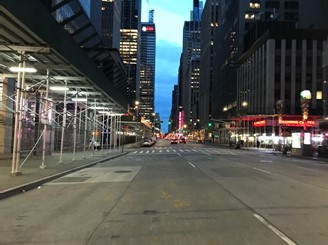
Down Broadway to the northern tip of Times Square – a place I usually avoid at all costs. Maybe a dozen people milling about, taking pictures of the emptiness, like me. Cops on horses, surveying. Only the blinding screens and signs above reminding of the busyness. Theaters shuttered, 8.5×11 printed signs on lobby doors, last-minute-made.
Over to 9th Ave, and down past the bus station. Some folks, mostly homeless, I think, gathering on corners. Some restaurants open for take-out only. I considered stopping for a slice at Two Bros, but the line was long, and the place looked dirty in a way I’m not used to caring about. And what would my roommate say? So I didn’t, even though I was starving by then.
When the pavement got bad on 9th, and then on 7th Ave, I crossed over to 5th, and rode down through Madison Square, usually a mess of various kinds of traffic, but now a breeze. Then down past The New School, gazing up at the corner windows of the building on 16th St. where, not so long ago, I met with friends and colleagues and faculty for classes, department events, late-night study sessions. That room that was always too cold, but had a view of the sunset, where you could hear a saxophone player in the afternoons, somewhere below.
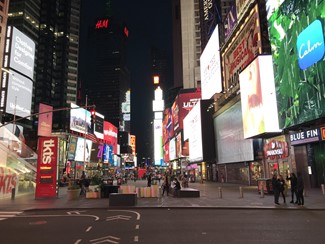
Then down around Washington Square Park, where what looked like college students laughed loudly, and some homeless folks with big bags gathered around benches. Through Greenwich Village for a few blocks, not many restaurants open here, but more people on the streets. Then over to Broadway, down through SoHo to Canal Street. Momentary disorientation in the dark. Then cutting through the off-ramps to the bike path, so familiar, to cross the Manhattan Bridge. Then I was on the same route I took every day, to and from school or work or the library or a theater. And I zoned out, as I often did, letting my mind wander, buffered by the pools of lamplight and the guardrails as I traversed the East River. The Empire State Building pulsed red like a heartbeat, dah-dum, dah-dum.
The contrast between rural and Manhattan was stark. It’s not like the streets of Greensboro, Vermont are normally packed with people. In Manhattan in the evening, the absence of people on the streets was palpable. But so was the feeling of people packed into houses and apartments, a presence of adjustment, waiting, watching, making do.
Friday, 5/22/20
Greensboro, VT
It’s my 30th birthday – one I’ve been looking forward to. Josh arranged a series of Zoom calls with groups of friends and family every evening this week. They were meant to be a surprise, and the first one was, but then a participant quickly gave the whole scheme away. I’ve had fun with it, and felt oh so loved, but it’s also exhausting. After two months of mostly only seeing Josh and Topper, the social time of travel plus the new roommates (from New York) plus the nightly social hours leave me simultaneously invigorated and drained. My concentration is limited. There’s always some task to complete, and it’s never reading or writing or applying for jobs. Maybe next week.
But the weather has been beautiful and we’ve been riding bikes most days. Today, Josh and I went on a long, hilly ride to visit the maple syruping friends from a social distance. Two of the three houses we visited were empty, but at the farthest point of the ride, two friends set out a table with snacks and cold water, and chatted with us from their porch.
I’m feeling the quarantine fatigue, combined with the lust for summer busy-ness. Our little house with a big yard has become a comfortable haven, and I haven’t tired of it. Venturing out feels both scary and exciting, and returns are bittersweet. Northern Vermont feels as far-flung as ever, and I dream of driving out – west or northeast (would they let us into Canada?).
Sunday, 5/24/20
Greensboro, VT
Today would have been my grandmother’s 93rd birthday. She died last October, Alzheimer’s, weak heart, all that. Naturally, more or less, of old age. We were supposed to have had a memorial service for her this weekend – a whole affair with family from across the country and around the world spending a weekend together, celebrating her many accomplishments, her spiritedness, relentlessly positive outlook, her love of nature, poetry, singing. We were meant to be dividing up the remains of the life she and my grandfather shared in an apartment in Concord, MA, carefully allocating pieces of jewelry and heavy furniture. Instead, the memorial was postponed to an unknown future date. Her ashes will rest above ground, for now, until they can be buried beside my grandfather’s in Sleepy Hollow cemetery.
So we gathered casually online. My aunt made the arrangements, and presided, more or less, though my dad tried to keep things light and moving along, contrasting his sister’s propensity for lengthy storytelling, tangents, verbal emotional processing. My other aunt read some letters that she’d received from old friends and distant family when she sent word of my grandmother’s death. People shared memories: cousins in Texas and South Carolina, a surrogate aunt in Italy, old neighbors, still in Massachusetts. I felt torn between wanting to make this a special occasion and not wanting to commit fully to this being the moment when we remember her, because I felt wildly unprepared for that.
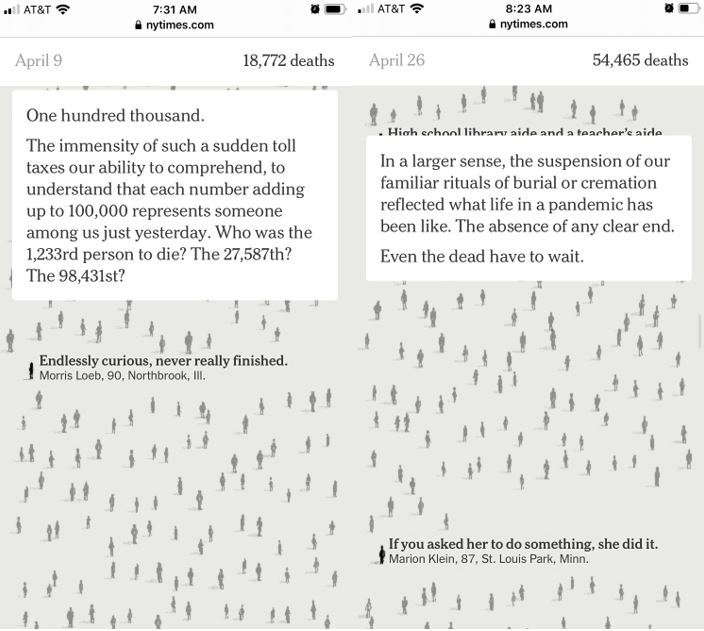
This morning I spent two hours reading through the New York Times’ list of 1000 names of people who have died of COVID in the US. 1000 names – representing 100,000 deaths that the US is close to reaching. Each name was accompanied by an age, location, and sentence describing the individual, presumably pulled from an obituary. All poignant, but some lines stuck with me: “Excellent cook, though she hated the task.” “Knew how to make an entrance.” “Endlessly curious, never really finished.”
And this one, about the inability to gather, to mourn as we’re used to, in the ways we know how, in the way we think our loved ones would have wanted: “Even the dead have to wait.”
Thursday, 5/28/20
The garden is growing like crazy because it’s been so hot all week. My world feels even smaller, with house guests pulling so much attention. Managing the temperature in the house, watering seedlings, walking dogs, weeding, prepping dinner, juggling wifi and hotspots to make sure everyone has sufficient internet…these things take all my focus. I’m beginning to worry about my productivity. I feel guilty for wanting time to myself to get things done (to write, to look for jobs), when everyone else in the house is work-working, and someone needs to do the dishes. Someone needs to plan for the next grocery restock. Someone needs to clean the bathrooms.
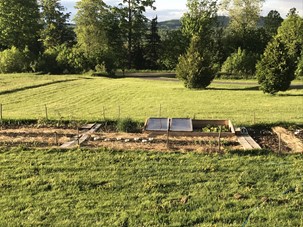
Today, a productive meeting about this diary project lifted my spirits. The heat will break tomorrow. The leaves are out, full-green though still soft and curled at the edges. On the ground, seedlings vie for sunlight. They’ll lose the competition soon enough, when the canopy above stretches its green palms wide. The midsummer understory will look very different from late spring.
Saturday, 5/30/20
Greensboro, VT
2020 takes another turn. Protests in Minneapolis, Brooklyn, Atlanta, Louisville…Social media threads and posts with graphics of their faces, promises to say their names – George Floyd, Breonna Taylor, Tony McDade, Ahmaud Arbery – promises to do more and be better and here are the actions you can take. Social media is not enough, protests are not enough. I spent yesterday evening glued to my phone, watching videos of protesters and police, people young, old, Black, white, Latinx, Menonite, LGBT – a blur of identities – peace and violence and people pushed to the ground and threatened by Tweets and journalists getting hit by rubber bullets or arrested on live TV, burning precincts, arms linked in solidarity, faces with and without masks because all of this is happening against the backdrop of a pandemic. Apocalyptic images compounded. But just like at so many other moments before and leading up to this one, since the colonization of this continent, since the first slave ships arrived from Africa, this is only the end of some worlds, only a threat to some lives. I watch a livestream of a police van burning on the edge of Fort Greene Park, near where I was sitting with two friends just a couple of weeks ago, a few blocks from the apartment I’m still paying rent for. I imagine my roommate listening to the shouts and sirens out the kitchen windows. I wonder if he’s there, watching the van burn, or joining the protest by Barclay’s Center. Would I be, were I not 350 miles north? I wonder what the COVID case count will be in a few weeks. I wonder if it will matter anymore. The spectacle of violence in the streets outweighs the hidden chaos of deaths in overburdened hospitals. I long to write a phone number on my arm in Sharpie and take to the streets. Instead, I scroll through Twitter and click donation links, one after another, late into the night.
Sunday, 5/31/20
We went to Morrisville for the afternoon, the closest town with lots of amenities. There’s a new rail trail there that Josh and I have meant to ride. So we brought all our bikes and rode the leisurely path that wound behind warehouses, breweries, backyards, through forests and corn fields. Many other people were out, on bikes or on foot, and I greeted some of them, mostly with a smile and a wave. Almost no one wore masks, but it seemed like everyone was holding their breath when they passed other people. And Josh and Bridget confirmed, when we paused at a crossroad, that they had been doing just that.
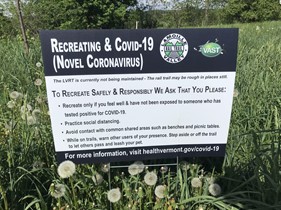
On our way back, we slowed down behind a Black woman with a stroller to let a large family group pass. Eight or ten kids, all school-aged or younger. One of the boys in the group wore a T-shirt that featured a Confederate flag and the words “Heritage Not Hate.” I had never seen that message before, so I read about it later. The slogan has to do with how the Confederacy and the Civil War are remembered by some: not as about slavery or oppression, but states rights and taxation. A selective version of history. You shouldn’t be able to cherry-pick the version of history you want – the Civil War wasn’t about taxation, it was about slavery. Our “heritage” is the centuries of oppression of Black bodies for the capital and social gain of white people. Our “heritage” is unequal access to resources and opportunities based on race, whether we deny it vehemently or not-so-vehemently. Our “heritage” is racism and white supremacy. And like hand-me-down clothes, we pass it on.
Tuesday, 6/2/20
We had a light frost last night. In JUNE. I’m worried about the garden.
But more worried about the powers that be. Trump’s hideous display of narcissism last night, when protestors in front of the White House were tear-gassed away so the commander-in-chief could walk to a nearby church for a photo op with a Bible. It looked like he’d never held a book before. And then there was a comparison with a photo of Hitler, holding a Bible in the same, awkward way, frowning. Televangelists speaking out against Trump for the first time in his presidency, condemning the use of church and Bible as props. And the slow realization by the media/public commentary I consume daily that tear-gas is banned in war. Yet currently prevalent on city streets across America.
Thursday, 6/4/20
My parents visited. They drove 5 hours to bring us seedlings and see our garden, sit in the sun and wind on the porch and talk about life and politics and work and what our respective small, rural communities are doing to reopen services and economies. They say again and again that they’re not worried about getting sick, that we should visit any time. My mom got an antibodies test last week, the kind that’s 90% accurate (compared to the collective 50% accuracy of antibody tests overall). It was negative. (She thought she’d maybe gotten COVID when visiting NYC at the end of February.) She’s been busy planning how to reopen libraries across New Hampshire, as part of a team of librarians. She said they’ve all gotten to the point of curbside pickup, but don’t want to let anyone physically enter the library – this feels like too big a step.
I find it hard to think about the coronavirus. News of the protests, of ongoing police brutality and calls for reform, and preoccupation with how best to engage – educate myself, have conversations with people, take to social media, donate more money (how much can I spare?), drive to a city – fill my headspace. COVID conversations feel almost trite.
In the evenings, we play games, or work on a jigsaw puzzle, me and Bridget, Josh and Aaron. We cook elaborate meals and always eat dessert. Josh and I are learning tech lingo: we have “stand-ups” in the morning, “synchs” some afternoons, “retros” on Fridays, and sometimes someone “spills the tea.” Generally, we’ve learned to share space, to live together. Topper and their dog, a little red one named Maddie, have cultivated a lovely friendship. They play together gently, making so many different sounds. Aaron said that Topper sounds like he’s translating Maddie’s dog-speak into human-speak. It’s been beyond rewarding to watch them grow closer. They’ll miss each other when Aaron and Bridget leave.
Saturday, 6/6/20
Burlington. We brought Aaron and Bridget to a rental car. They’re going to New Haven next, to stay with another friend and continue avoiding New York. Though I heard Aaron comment on the phone to someone about how strange it is to be away from the city right now.
Not that there’s no work to be done in Vermont, the second-whitest state in the nation. We saw a parade of cars with Black Lives Matter and other signage, horns honking, wind through Winooski. We were parked at an intersection. I rolled down the windows, waved, and tried to join the honk-fest, only to discover that the car horn is broken.
Burlington was hoppin.’ Lots of people out and about, at stores, on the streets, at outdoor restaurants, lined up beside Trader Joe’s. Almost everyone wearing masks, but constantly adjusting, touching their faces, clearly trying but only half-heartedly. We went to Costco, the warehouse-huge bulk-goods store. The six-foot rule didn’t seem to apply, and people were paying less attention to each other than normal, so it happened several times that someone ran into my cart, or trapped me down an aisle. Our personal bubbles have become more brittle and more opaque, shattering easily and blurring our vision.
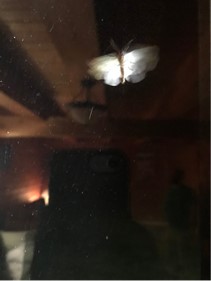
Josh and I visited a friend who just moved to Burlington. She was working in Chile all winter and bound for a summer in Alaska, but that was cancelled. So she came here. Sometimes I feel like we used to be closer – we even shared bunk beds for a few months one year in Boston. I’m one of the people she calls with relationship or career problems, and I love that. But I wonder if I confide in her the way she does in me, anymore. I’m not exactly sure why, but sometimes that gap feels wider than I expect. This was one of those times. I think of the issue is Josh. Despite my best intentions and deepest desires, (and, I think, his too) our relationship has quashed some of my always-fierce independence. I’m a bit anxious about living alone with him again, after having friends around for three weeks, and now that neither of us have schedules to follow anymore, just the random meeting or nebulous project to finish. COVID provided an excuse for me to acquiesce to the quiet, isolated life that he so loves. I didn’t mind – I even enjoyed it. The season and weather helped too – the snow, cold, mud, black flies. But now it really feels like summer, and all the possibilities of long days in the north, or warm nights bicycling through city streets press with nostalgic longing on the backsides of my eyes. I love nature, and the wild lush green of Vermont, which sprung from frozen dirt to full leaves in a mere week with stunning readiness. (The other night, a huge black bear loped through the field beside our house as we were sitting down to dinner, the glossy length of his coat visible from a distance as it caught the waning light.) But now I long for a density of human sounds, bodies, movements, voices, a density of daily life, whatever the pace – and not in a way that’s new because of months of social distancing. No, this is an all-too-familiar feeling, this claustrophobia of country life.
Our house feels empty when we return. At first, it’s peaceful, and I’m grateful for quiet.
Sunday, 6/7/20
This morning, a phone call with old friends – the social worker, and the one in Mexico – has become a book club. We’re all listening to Ibram X. Kendi’s How to Be an Antiracist together. We tried to remember when we each first encountered notions of race, and what conversations our parents and teachers had with us about race in our early years. Our memories were patchy, consisting of guilty feelings and momentary, partial revelations. The stomach-clenching realization that with these friends, with whom I’ve always talked about everything, I’ve never talked about race.
In the afternoon, an outdoor gathering with local friends, to celebrate a 20th wedding anniversary and an engagement. I wasn’t in a very celebratory mood, and it took a while to settle into the small talk, and then even longer to have more “real” conversations, like about the protests. Luckily, we had hours together, everyone gradually giving into the sunny Sunday afternoon, alcohol easing tensions both social and physical, our shoulders softening, our inhibitions loosening. It felt luxurious and on-the-brink. We don’t know when it will happen again, and two of those friends are about to move away. The general precarity of the world is being met by some with pulling up roots and by others with digging them in deep. I feel somewhere in between, and unable, as usual, to articulate it. All I could do was answer questions about summer plans with everything from applying for jobs in Montana to joining the protests as a street medic – both of which I’m marginally qualified for, and neither of which I expect to actually happen (this with that same pressure behind the eyes, that lump in my throat).
I’ve lost track of what and where is “open.” The logic eludes me. What does it mean when the streets at the epicenter of the pandemic are crowded with angry, change-making bodies but I resist hugging an old friend in her backyard? What is “open” when windows are smashed and Black folks can’t breathe and history seems to be repeating itself and we all pray that it is because we need change but also that it isn’t because in 1968 Conservatives won the White House?
Vermont is lifting its mandatory 14-day quarantine for visitors who are coming from a county in New York or New England that has a similar COVID rate as Vermont. There’s a map on the health department’s website: who is assumed to be contaminated, and who is not.
Wednesday, 6/10/20
We have more visitors! Lynn and husband, friends from when we lived in Ohio, three years ago. They drove up from their new home in North Carolina, via Ohio and Pennsylvania, with their 3 and 5 year-old daughters. Brave. To all of our delight and surprise, Topper remembered them immediately. He usually takes a long time to warm up to new people – they have to abide by all kinds of rules like not looking at him directly, not moving too quickly or actively trying to befriend him. Even for the best rule-followers who do everything right it might take over a week of living in the same house before he’ll let them pet him. So we were thrilled that he remembered these friends from the first years of his life, and we could bypass the (re)introduction period. For such a fearful/antisocial dog, he really loves the people he loves. He showers them with affection both exuberantly and quietly: from violent tag wags upon first sight to little licks on your hand as he wanders past.
This morning, the 3-year-old and I dug up weeds from the garden. While she was napping in the afternoon, I played a complex make believe game with the 5-year-old. The adults have endless things to talk about, and it’s a relief to have lots of ground to cover besides just the pandemic and the protests. Of course, we always circle back to the current political moment, to the differences between North Carolina, Vermont, and other places we’ve lived, to our jobs (or search for a job, in my case), and to their kids. It’s fun to spend time with the kids, to get to know them. I haven’t made new kid friends in a while.
Saturday, 6/13/20
My brother and sister-in-law bought a new house, outside of Cambridge, MA, where they live now. Josh’s brother and sister-in-law are actively looking for a new house. I keep reading about people fleeing cities. My ever-mellow brother hit a panic point when faced with the possibility that schools might not reopen in the fall. He was stressed about the prospect of homeschooling his two energetic daughters while trying to work full-time from home in their small apartment. So they bought a giant house in the suburbs. Another example of how the pandemic will only further increase opportunity disparities, as wealthier folks move out of the cities, out of more diverse school districts, and schools open only partly, and continue to rely on distance learning, which is already unevenly accessible.
Our house is empty again. I tried, unsuccessfully, to make up for the days lost to visitors this week. Stumbled through the beginnings of two cover letters, fixed up a resume (I have too many different versions – it makes each application process painfully labor-intensive), browsed for other opportunities. I’ll try again tomorrow.
Monday, 6/14/20
This morning, when I went to pick up Meals on Wheels food for delivery, I saw a woman sitting in a lawn chair outside a window at the nursing home. She’s been there most weeks, I realized. Probably visiting a resident, talking on their phones, and looking at each other through the window.
I had an encounter that seems like it will bother me for a long time. My second-to-last delivery was to a woman who I haven’t seen in a few weeks. She’s normally reticent, says hi, thank you, see you next week, and that’s it. Today, she came right out, eager to chat about her new horse. On her cement patio, clearly written in a child’s handwriting, inside a chalk heart, were the words “white lives matter.” I stepped on the drawing as I approached her door. I didn’t know what to say about it. So we talked about her horse until she noticed the chalk. “Oh, look what my granddaughter drew,” she said. A million potential responses raced through my mind, and my position as educated, complicit, relatively well-off, having to come to her house every week to deliver this social service that she relied on…all of this ended with, “uh huh.” What does she think that means to her granddaughter? How old is her granddaughter? Who gave her granddaughter that idea? Does she know what implications those words have, especially right now? Has she been watching the news? What’s her news source? Why didn’t she notice the drawing sooner? Or did she, and now she’s covering it up, playing it off like she didn’t know, because she does know. She knows what those words imply, knows that they shouldn’t be displayed like that, knows that I probably don’t agree with that white supremacist statement.
Thursday, 6/18/20
I went swimming with the friend who just moved to Vermont. We met at a dramatic rock formation along the Lamoille River called Dogs Head Falls. We opted to share a car to get from downtown to the river spot, though it wasn’t long enough that we would have saved a lot of gas, and I regretted it a bit afterward. It seemed like unnecessary risk, even though we talked about how neither of us was too concerned. But I did just have visitors from out-of-state, which she knew about…
Very few other people were at the falls, surprising given the hot day. We swam and talked about our future plans. She’s feeling lost, so am I. Her career had been hitting an exciting stage (she works for an outdoor education/expedition school), and then the pandemic hit, and the school cancelled almost all of its summer programming, and will run significantly fewer courses in the next year. She doesn’t know where or when she’ll have work, and if she’ll even want it, given the travel and risk involved. I told her about my frustration with my own productivity, my job search. She asked me if I’m happy in my relationship. We talked about the protests, and how we’ve been engaging in the movement – learning, unlearning, and making lots of small donations to various organizations. It was cathartic to reconnect with her in a way we haven’t in a long time.
I stopped at the grocery store on the way home. Fewer people were wearing masks, and the summer vibes were obvious and accompanied by the laissez-faire dismissal of COVID rules. I wore my mask, and sanitized my grocery cart, tried not to touch any items besides the ones I purchased. Still there were empty grocery shelves, still no flour, not much meat.
Friday, 6/19/20
Juneteenth!
This morning I joined a webinar on land reparations. A group of white folks who identify as “reparations accomplices” told us about the Black Land Project, and the idea of returning land to Black communities and Black land stewardship.
I went with a friend, Sayre, to a vigil in Essex Junction. During rush hour, we stood with maybe 150 other people at a busy intersection known as the 5 Corners. We held signs (“Black Lives Matter,” “Defund the Police,” “Equity Now,” “Racism is a Virus”) standing 6 feet apart (roughly). Right before 6 pm, we read aloud names of African Americans killed by police, then stood in silence for 8:46 in memory of George Floyd, in solidarity with the Movement for Black Lives. Then the vigil disbanded.
It was the first event I’d been to, and I was glad to have gone, performative as it might have been, to see what’s happening in the streets of Vermont (one of the whitest states in the nation). But other activities, like the land reparations webinar, and reading about anti-racism, have felt more productive, ultimately.
On the way home, we stopped at an outdoor restaurant along the road. Crazy to eat restaurant food and listen to live music. We talked about misogyny in Vermont, in our lives in general, and about the discomfort and necessity of having difficult conversations about race.
Sunday, 6/21/20
The summer solstice was yesterday. We had a few friends over, to sit outside, some feet apart, around a campfire. We watched the sun set, talked about projects we’re working on. Nina is ramping up her new added-value food product business, weighing possible next steps. Cory and Sayre are getting ready to move out of state. Tim and Nina’s two teenage boys came by later, returned from a protest in Burlington. They said it was good, inspiring, though they couldn’t quite remember in what way. We talked about the march in solidarity with BLM that had taken place in tiny Craftsbury last week. There was a pickup truck counter-protesting. Since then, the farmers market sign has been vandalized, and the “Black Lives Matter” slogan that was painted on the main street has tire burn-out marks all over it. Somehow from there we got talking about aliens, and the Eurocentric assumption so often made by Hollywood and others that aliens would want to conquer and colonize Earth. Tim, an anthropologist, fiercely defended the alternative: it’s not “natural” or “universal” (as in, also applicable to non-Earthlings), this need/desire to dominate others. And so took place a mini history lesson on the colonization of the Americas, a global expansion unprecedented in human history before or since. No jump from there to the current politics of the moment, the Movement for Black Lives and the imperial project of slavery – but of course they’re related. And in the kitchen, after the guests had departed, I explained that to Josh, made it clear in case he hadn’t gotten there himself. It’s all related. We’re all implicated.
Maybe aliens, watching us, collecting data from a great distance, have realized the extreme fragility of our social and environmental ecosystems, and are watching without interfering, terrified that this little planet and all its biocultural diversity will fail to save itself.
This morning, an interview with a Puerto Rican mother whose daughter was killed in the Sandy Hook shootings, whose husband is Black, who worries every day for her teenage son. Shame on us/US, she said, if we fail to make change happen now, if we let yet another opportunity pass.
Monday, 6/22/20
The woman with the racist granddaughter on my MOW route had a friend over when I got there. The friend (and maybe landlady) arrived on golf cart from another part of the property. She drove up at the same time as me, and they stood chatting as I packed bags with meals. I dawdled at the end, in case the friend left and I could talk to the woman alone. No chance. They both looked at me expectantly, then glaringly, until I said goodbye.
Wednesday, 6/24/20
Tamworth, NH
I’m at my parents’ house in NH. Josh and Topper too. We came here yesterday, in two cars, to visit my parents and help care for my nieces, who are staying for the week. They have so much energy, but have learned to play together better since COVID made them each others’ only playmates. Disagreements about what and how to play that used to dissolve into screams and tears almost immediately now stand a chance of being worked out quietly between the two of them, no adult intervention required.
Tamworth in the summer is usually bustling with seasonal residents, tourists, and locals shopping or snacking at one of the two stores in town, visiting the library, attending summer stock shows at the theater. But Main Street is largely empty. My mom has been working more at the library, facilitating curbside pickups. The head librarian is in the hospital this week (not with COVID, a detail that always needs to be noted these days), so my mom is working more. She’s fairly relaxed about COVID. She was a nurse practitioner in her previous career, and has a degree in public health, and she sees our main COVID-related problem as human behavior. It’s really hard to change human behavior, and even her fellow librarians get fed up wearing masks at work. Despite her incredibly persuasive (in my vast experience) way of presenting facts and evidence, of encouraging people to just do it, even though it’s uncomfortable, plan to take breaks when you’re alone or outside, away from others…even she doesn’t have her usual sway.
We swam this morning at a nearby lake. My nieces, Emma and Fanny, stayed in the water until their lips turned blue and teeth chattered. Topper swam all around us, checking on everyone and chasing sticks we threw. No one else was at the lake – probably because it was threatening to rain, and still hadn’t reached the warm part of the day.
Tonight, I sat around on a friend’s lawn, gazing at half-covered faces of friends I’ve known for over two decades, all of whom have moved back to Tamworth in the last couple of years for different reasons: relationship problems, job opportunity, COVID. We talked about mental health (theirs), our families, how hard it is to be overworked right now, how hard it is to be unemployed right now, how hard it is to make small talk, to interact with other bodies…Mostly it was just nice to see them, in person. Though odd to see them with masks. Once in a while one of them would lower a mask to take a drink or free a mosquito stuck inside – these moments were exciting, intimate, like they were revealing a hidden part of themselves that I longed to see because I love them. Returning to my hometown already overwhelms me with nostalgia, and now this simultaneous longing for normalcy, to embrace people, to relax, the way we normally do around each other…
Friday, 6/26/20
Tamworth, NH
My brother and sister-in-law came to my parents’ house too. This afternoon they all went swimming while I joined the class that has been ongoing, every other week. We still read and write something each week, and it’s been challenging to get it done, but I’m so grateful for the ongoing activity, and getting to see people from the anthropology department and talk about what’s happening in the world. A couple times, before and after they left for the lake, my nieces barged into the room where I was Zooming.
Lisa, my sister-in-law, commented many times on how nice it was to act “normal” around other people. They haven’t shared a space with anyone but their family of 4 since this all started. She’s a pediatrician, and wears full PPE in the hospital all the time, and hasn’t been treating COVID patients. At first it was hard for her to communicate with patients through masks, but now she says how amazing it is that you can tell so much from someone’s eyes.
My brother, dad, and I played music on the porch late into the evening, something I would have been doing, perhaps, outside, around a campfire, at the camp in Washington state, had it not been for the shutdown. So many of the tunes we played remind me of a specific time my life, are inextricably bound to people or places that now feel more distant than ever.
Sunday, 6/28/20
Brooklyn, NY
Back in Brooklyn, to move out of my apartment, and say some goodbyes, or goodbye-for-nows.
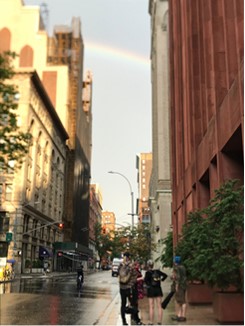
Yesterday, I hung out with my current roommate, Jeff, and our former roommate, and their partners. Fort Greene Park was the hub of our activities and many others’. Jeff isn’t being as strict about wearing masks in the apartment. It’s too hot, too stuffy, doesn’t provide any relief.
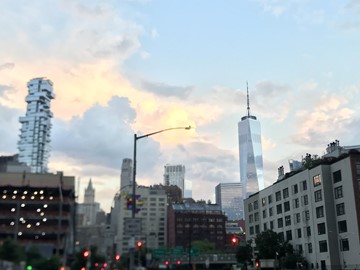
This morning, again, I sat in the park with friends from NSSR. We opted to go maskless, though keep our feet of distance. We chatted leisurely about life, the anthropology department, summer plans, fall plans, travel bans. Hours passed in a summery haze. Later, I rode into Manhattan with Jeff to see if we could join a rally in Washington Square Park. A flat tire on my bike caused us to arrive just as it started to dump rain. We took shelter in NYU Bobst library’s entryway with other folks, many of whom wore T-shirts, ribbons, or carried signs supporting Black lives, Black Trans lives, or bedecked with rainbows. Today marks the 50th anniversary of the Pride March in NYC, a tradition started by Black Trans activists in the wake of Stonewall. The Pride parade (a heavily corporate sponsored event these days) was cancelled this year due to COVID, but people took to the streets, combining the BLM movement with Pride in the Queer Liberation March. After the rain, hail, and thunder passed, a double rainbow stretched over West 4th Street.
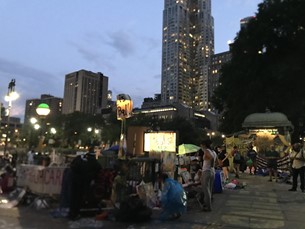
I walked my unrideable bike around some more, alone. Visited Stonewall, where the street outside had become a block party. Almost no one in a mask, all ages, races, genders, dancing, drinking, snapping selfies. “Say My Name” by Destiny’s Child came on the loudspeaker, and the DJ paused at every line of the chorus and called “Say her name” or “Say his name” and the crowd responded with “Breonna Taylor,” “George Floyd,” “Tony McDade,” and more.
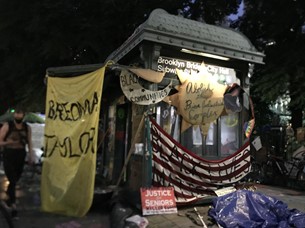
I walked to City Hall, where the Occupy movement has returned (though in a different form) to demand cuts to the NYPD budget, due on June 30th. I wandered through the camp, reminded of the years I lived in Boston and attended Occupy protests and rallies. I made some signs to hang on the police barricades, and listened to words about police brutality, Marxism, anti-racism, social contracts, and new donations that had just arrived. In one corner, recently soaked by the rain, was an ad-hoc memorial for the people whose deaths have sparked this movement. I felt some comfort, some ability to process, minutely, the intensity of this historical moment, as I wandered, anonymous, through a crowd of masked strangers freely sharing space, resources, and ideas. This kind of anonymity in a crowd is something I’ve always loved, and I missed it during the quarantine.
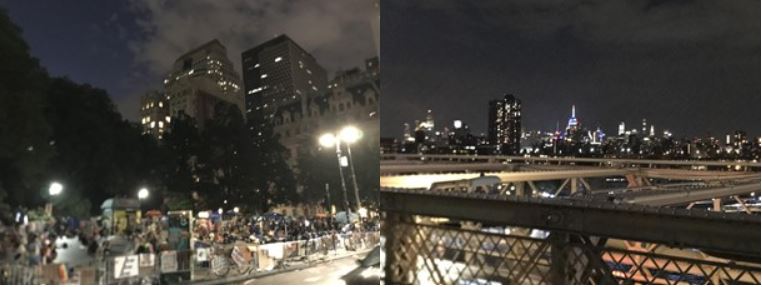
I visited my favorite bike mechanic at his shop. I told him I’d heard about his son. He cried, as I expected, and I teared up too, tried to stay with him in the moment, remembering that feeling after a profound loss, when tears are always near the surface, consistently uncontainable, day after day.
Tuesday, 6/30/20
Brooklyn, NY
My last corona diary entry.
It’s fitting. Tonight will be my last night in my apartment in Fort Greene, Brooklyn. Though my lease isn’t up until the end of July, I’m hoping they find someone to move in early, and it’s harder just to swing down and move out on a whim with the necessary quarantine on one end or another. Now, NYC is asking people coming into the city from hot spots to quarantine, since things here are under control.
I’m in the midst of packing. Over two years of grad school the most notable accumulation is books. Otherwise, I don’t have much more than what I moved down with: clothes, a small table, a chair, some knickknacks, a lamp. And my bike. How I love riding the city on my bike. Especially in the summer, especially on a warm night when the lights are soft-bright spots and shadows, blurry and distant and the air is thick with summer stickiness and salt water scent and your moving body melts into it, gliding over the bumpy streets, catching glimpses through backlit windows, late-night dog-walkers, snips of music on the sidewalk or stoplight…Even now, wearing a mask, it’s still freeing.
New York feels different than it did three months ago. Partly it’s the summer weather: people are out and about, sitting in the parks, meeting for socially distant walks and gatherings. Outdoor dining tables have extended into parking spaces. Ad-hoc tables and serving windows in storefronts with tarps strung up overhead (like the taco place two blocks over). There’s less car traffic, more bike and foot traffic, less movement in general. And of course, the protests. People are taking back the streets. And it feels wonderful.
I just emptied my food cabinet in the small shared kitchen. Cans of beans, pasta, cartons of soup — all purchased in the days and weeks before the shut-down, when fears of being stuck inside my apartment inspired my grocery shopping habits. I sat here, where I’m sitting now, and wrote furiously in a paper journal. Feeling, in waves of curiosity and dread, the intensity of the moment. The need to witness, to document, to write. (I later copied that first diary entry in the time of COVID-19 into the digital diary I’ve been keeping since.)
Three and a half months. Hard to believe. I’m sad to be leaving this little room at the top of a house with an orange door. I’ll miss the sky lights, the feeling of being either in a tower or a cave, depending on the time of day. I might even miss the low, sloping ceiling and crooked stairs. I’ll miss the sunlight streaming in through the kitchen windows in the morning, when I’m the only one awake early enough to enjoy it. I’ll miss watching the street out those windows, the neighbors’ art projects, the domino games, the Uber drivers who pull up out front, where a fire hydrant provides a space to stop and check a phone, eat a sandwich, change a shirt. I’ll miss late-night conversations with my roommate, talking about whatever – theater, literature, politics. I won’t miss his unwillingness to get rid of things, even if he can’t remember where they came from or what he used them for. Now, more than ever, he’s spread his stuff out in the common spaces. As he should — he’s been living alone for months now, since our other roommate started house-sitting for a wealthy couple in Cobble Hill. I’m grateful that I was able to go to Vermont, to give him space, myself space, as our physical worlds contracted.
At the same time, I missed witnessing New York in one of its defining moments, as the epicenter of the COVID-19 pandemic. It will surely become a historical marker, one of those things New Yorkers check each other with: “Did you stay through the quarantine?” And then they might ask about the curfew, too, the week of protests, looting, the drone of helicopters (“This is the sound of the police losing,” one friend had to remind herself, growing angry) that replaced the drone of sirens. Now the audio landscape includes fireworks every night, and conspiracy theories abound. Some kids near the park the other night were shooting Roman candles into the air from a street corner. I stopped to watch. Delighted by their delight. Able to enjoy the revelry, at least for a moment, because I can sleep through it, unlike many people. (Last night I had dinner with my cousin, who works for the public advocate’s office, and he said, “I just don’t understand the fireworks. I mean, you can’t do that. It’s not allowed. It’s just not allowed! You can’t do that!”)
Monday, I did some work in the morning, saw a friend in the afternoon, and biked into the city to visit the Occupy camp at City Hall (more police than the day before), and then meet my cousin for dinner. Outside dining on a street in SoHo — a luxury even in ordinary times — felt otherworldly.
Today, I met Isabel and Jose for breakfast in Prospect Park. We brought our own food (though I did try one of Jose’s chocolate pancakes with homemade blueberry jam), and sat far enough apart that we could take our masks off. It was much more relaxed than our last meeting. Still no hugs, but we could talk more freely. They’re happier since moving to a different apartment. Still waiting for Colombia to open its borders or for passage on a humanitarian flight in August. The New School will be completely online in the fall, so they hope to be in Colombia for the whole semester. If all goes according to plan, I probably won’t see them again until 2021. We spent a few hours in the park, talking about their life since they moved, their plans for the fall, Isabel’s new job, my job search, New York and how we love it, academia and how we hate it. The thrill of sitting with friends, in person, in public, just talking, is sharp and sweet. Our parting was hasty, because it started to rain.

































